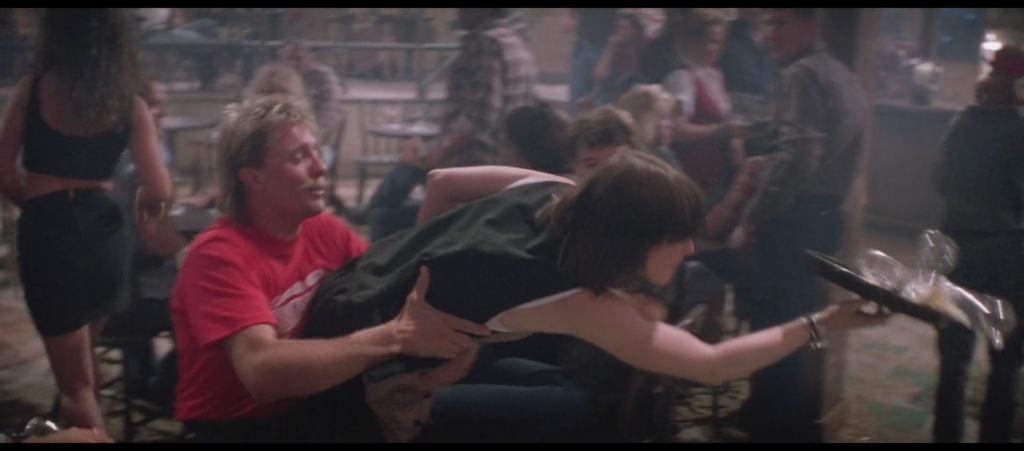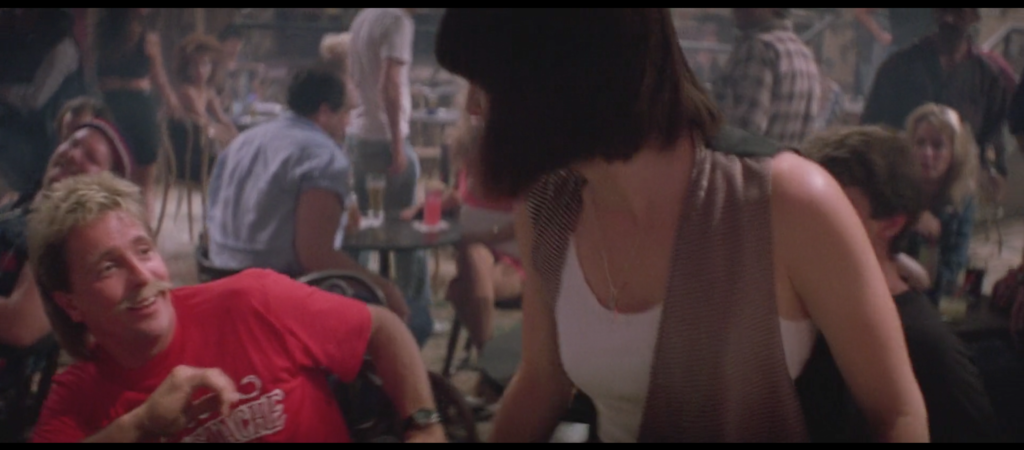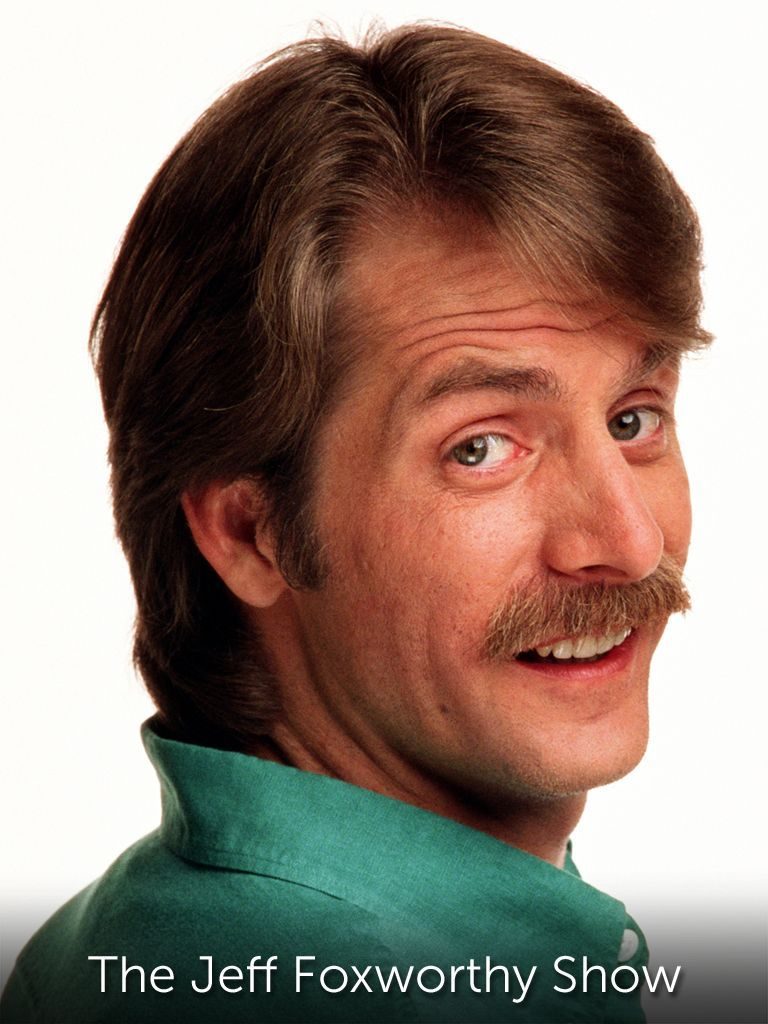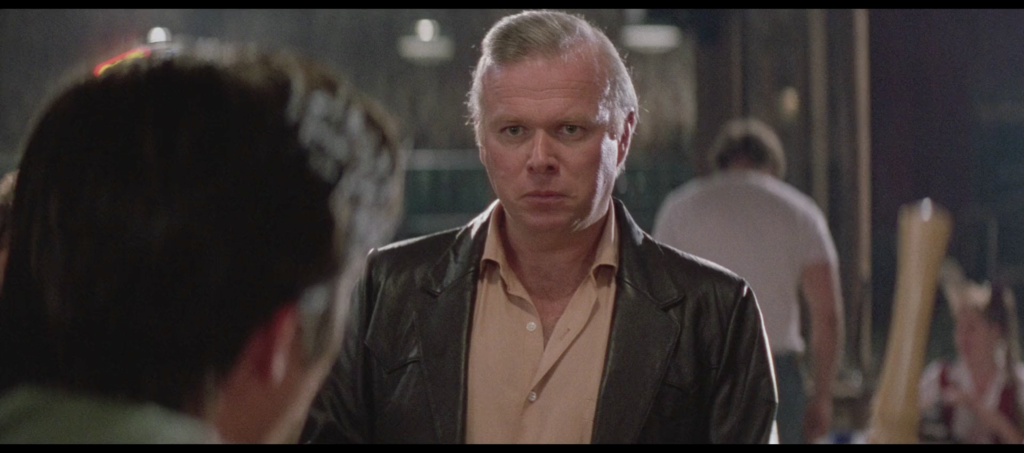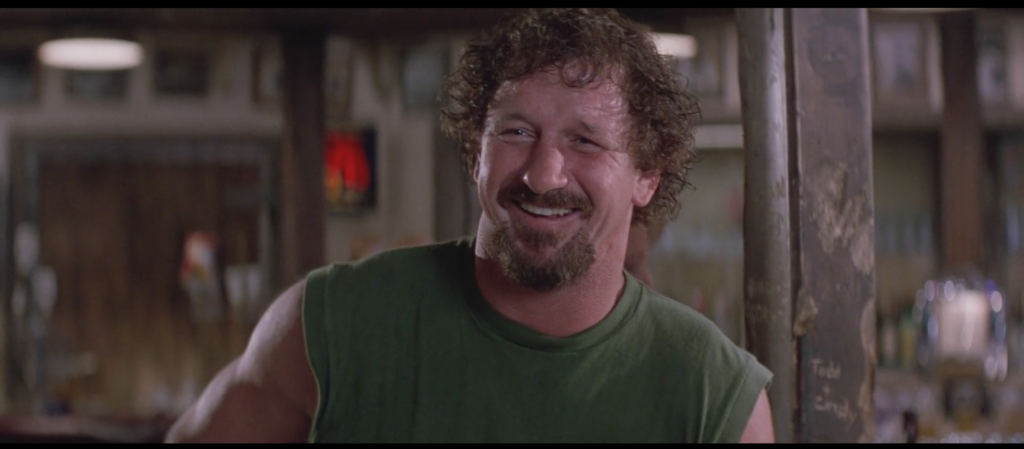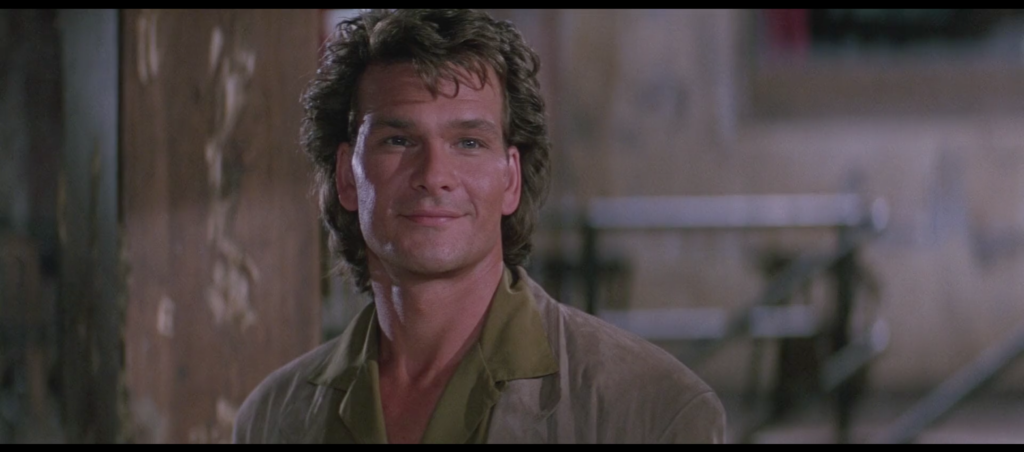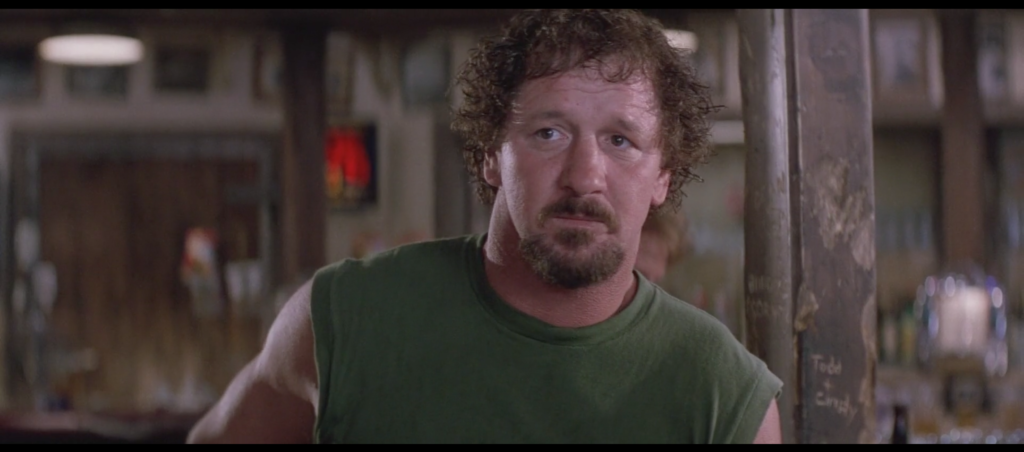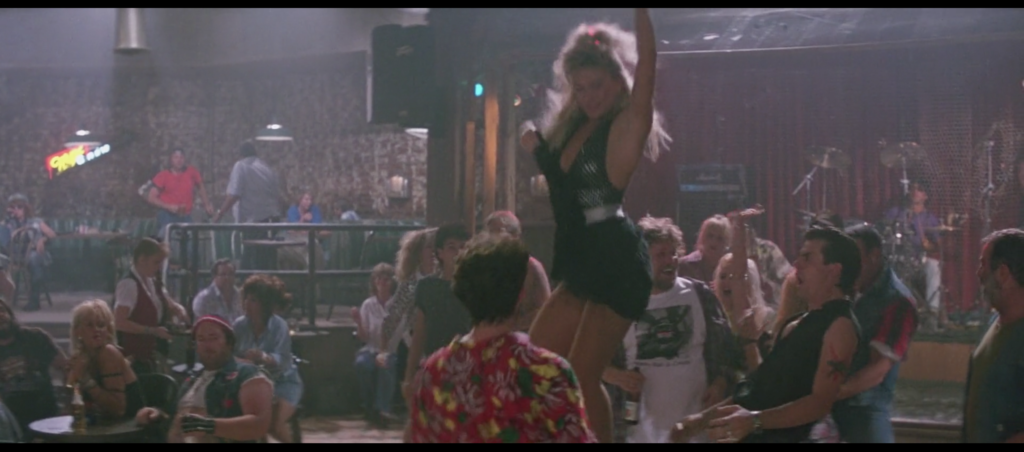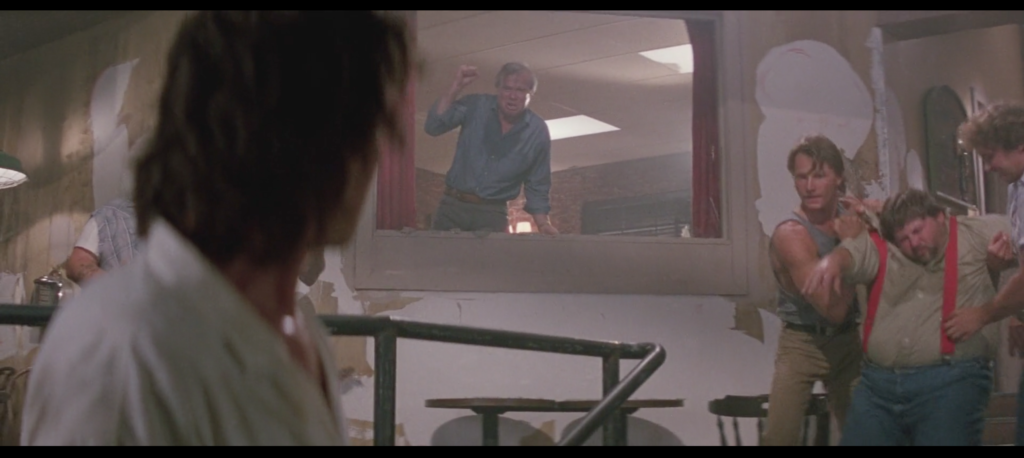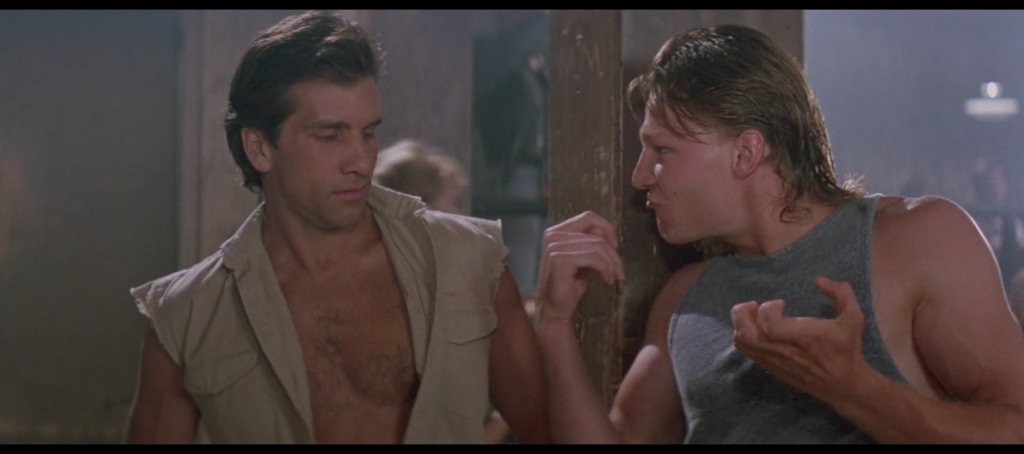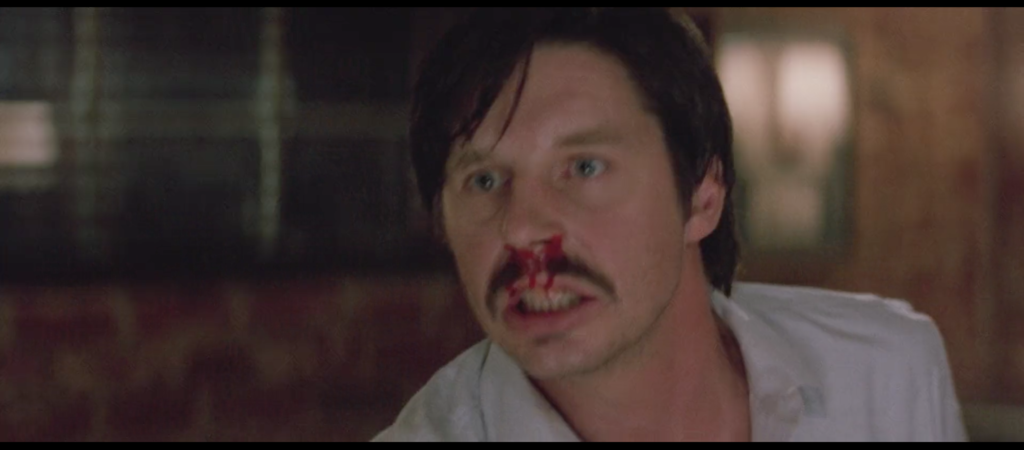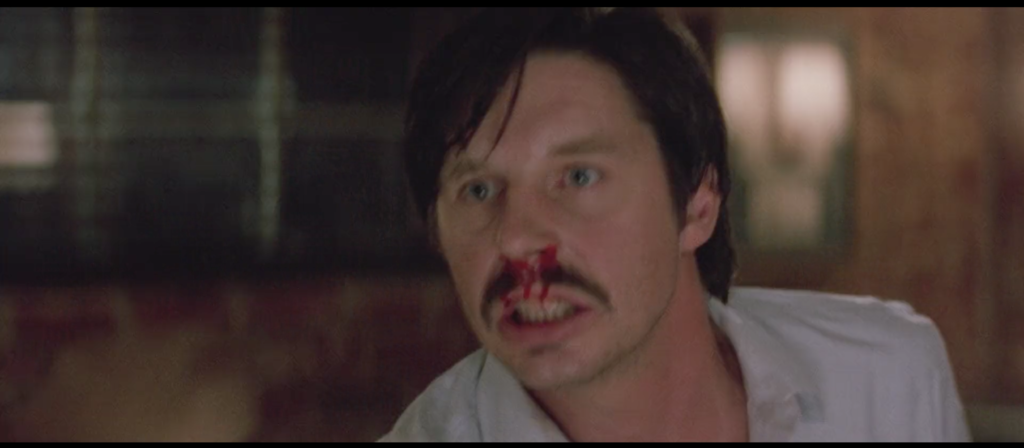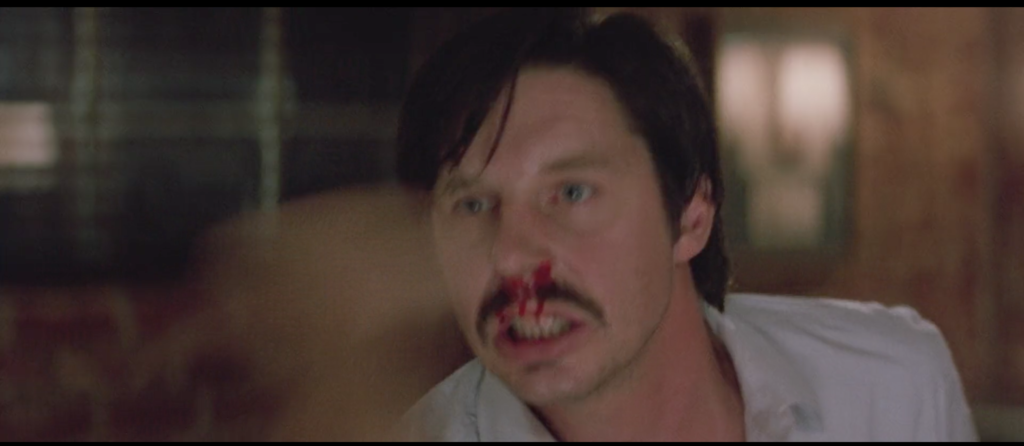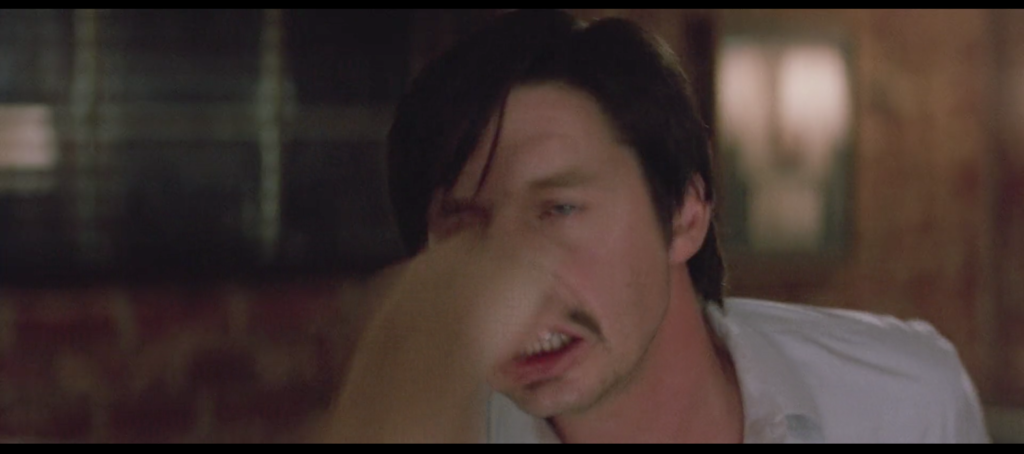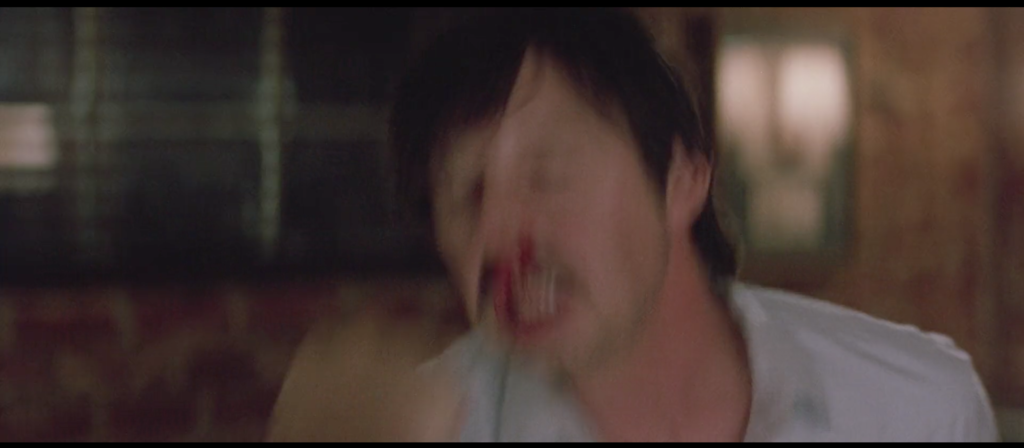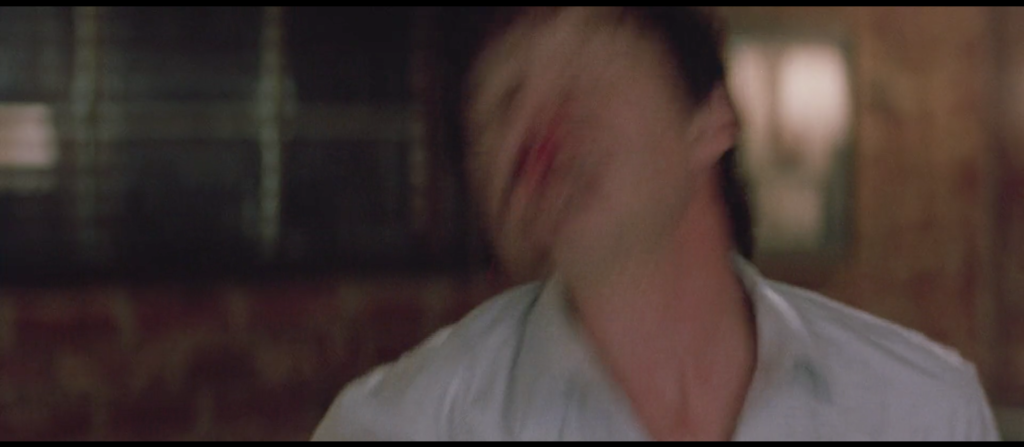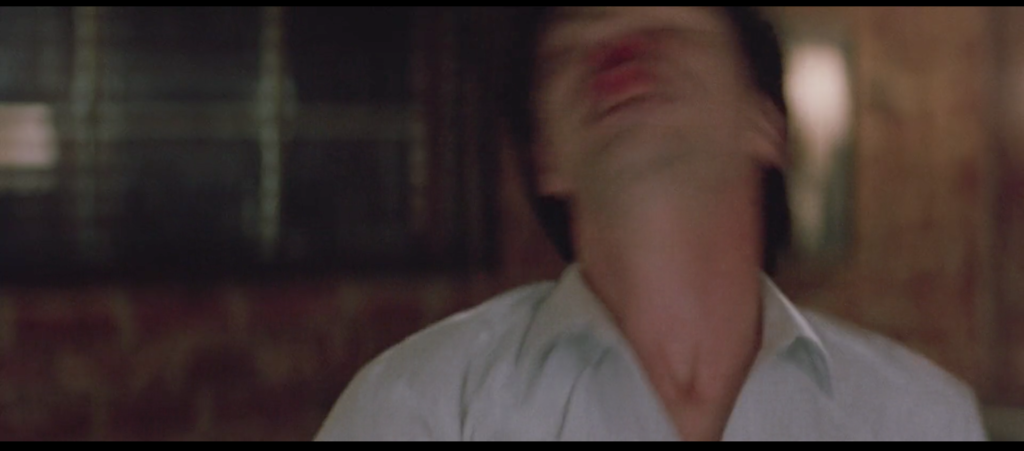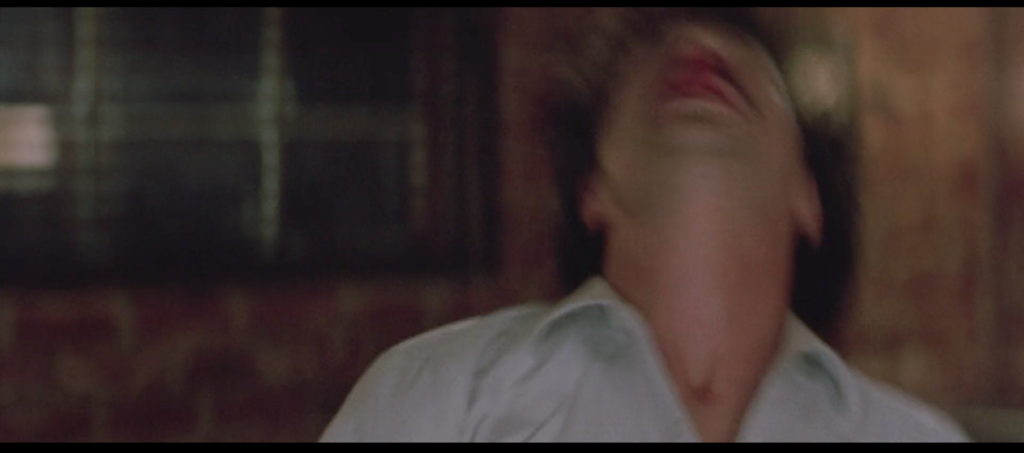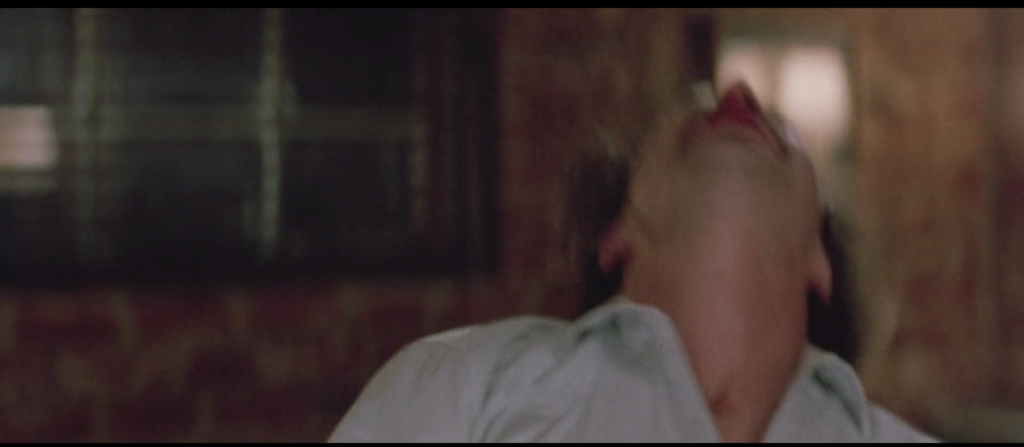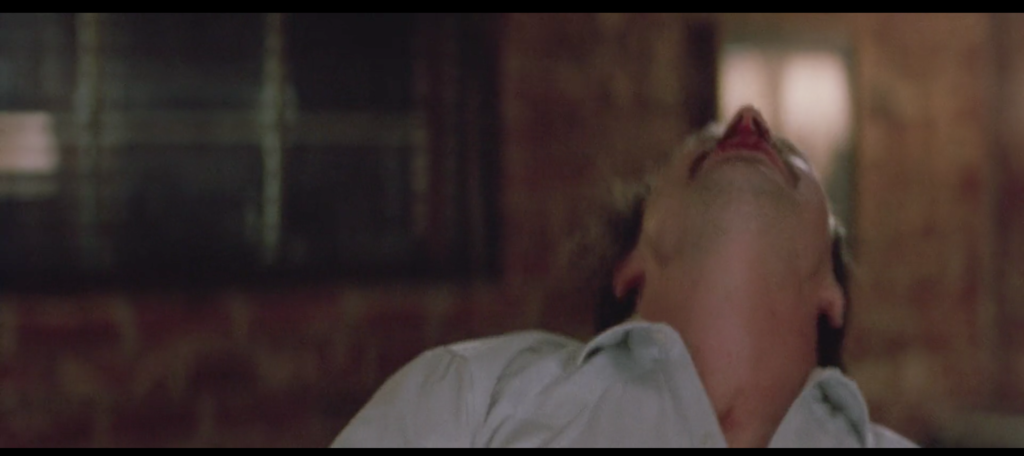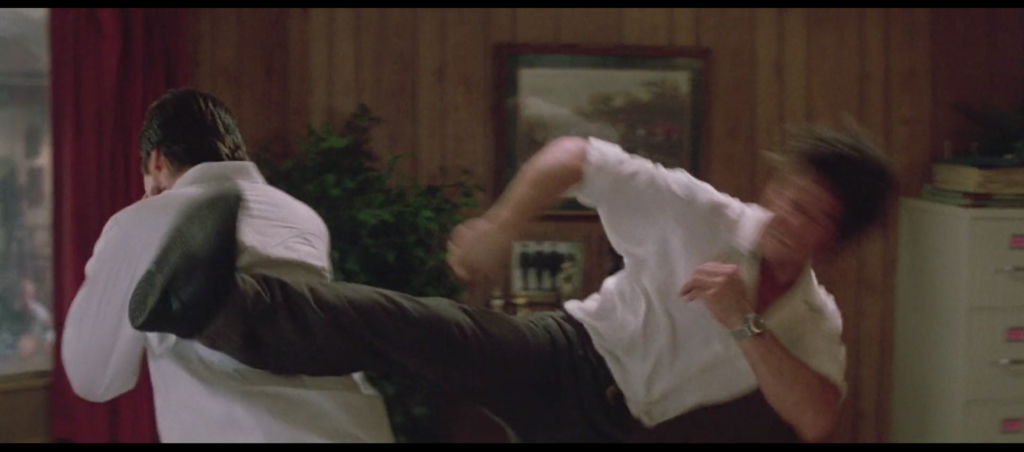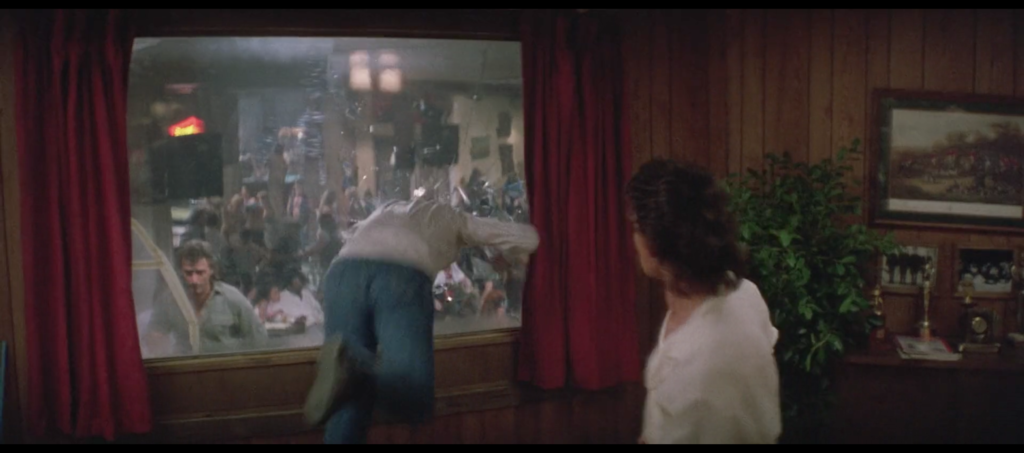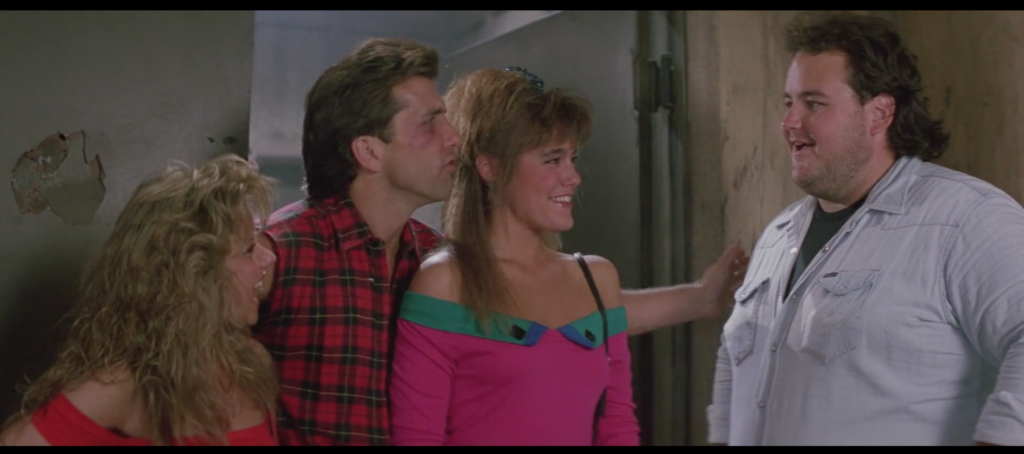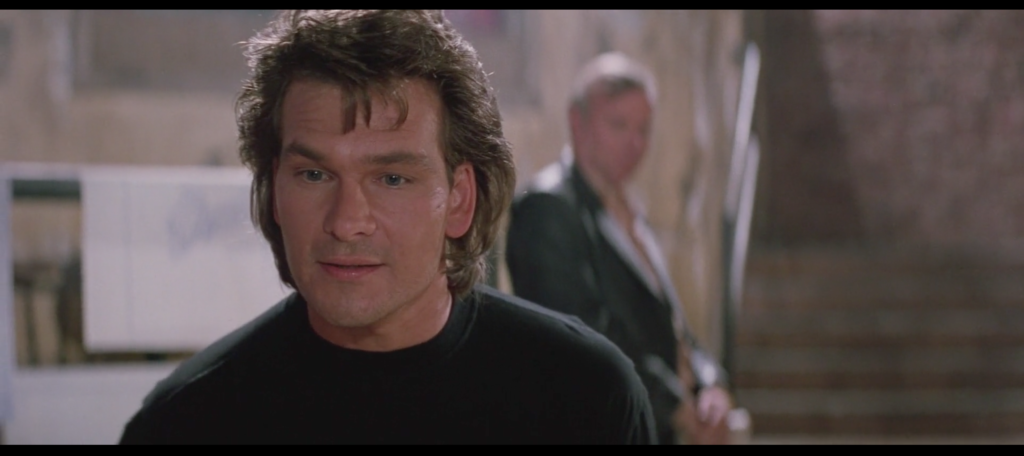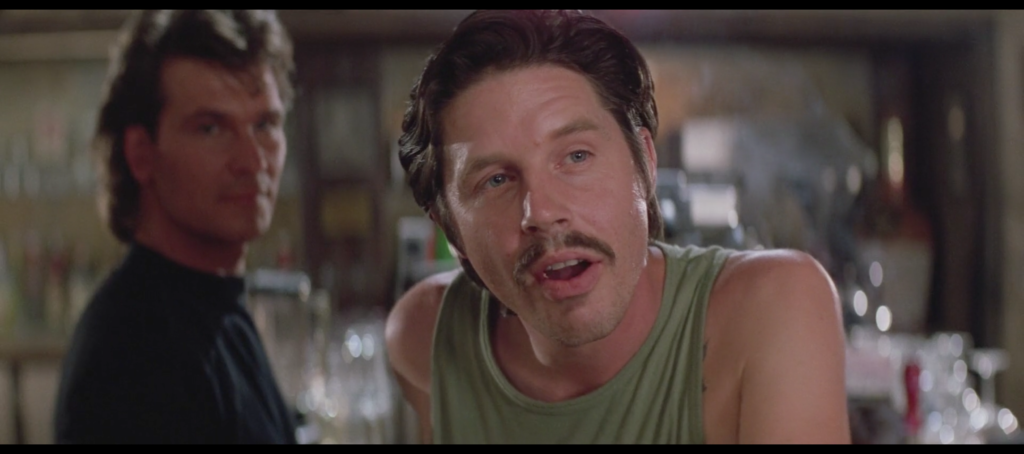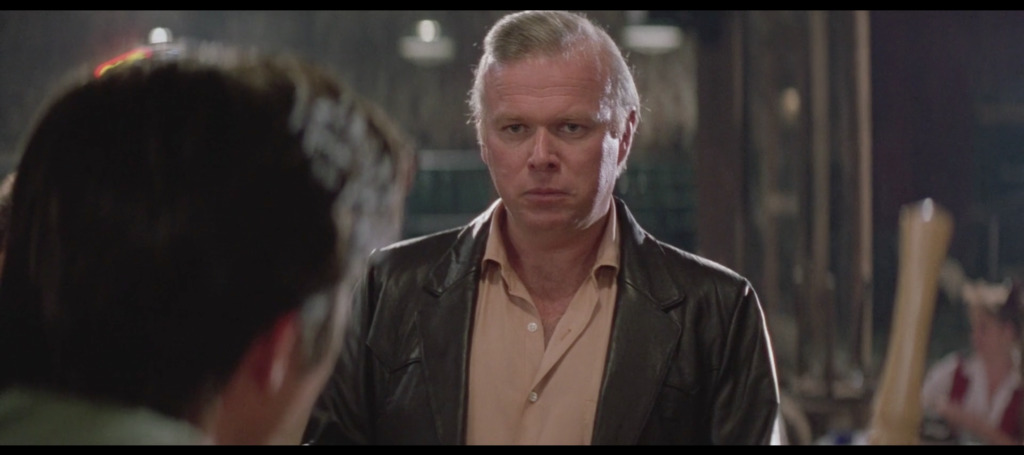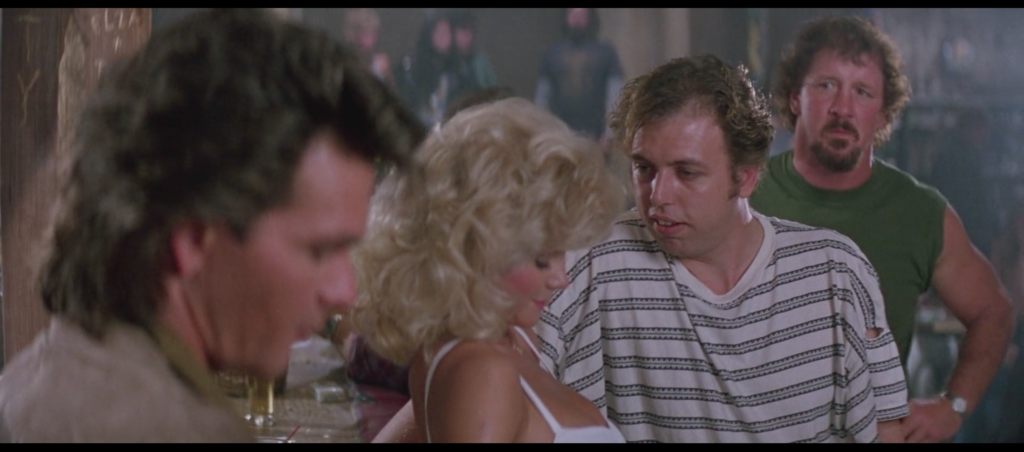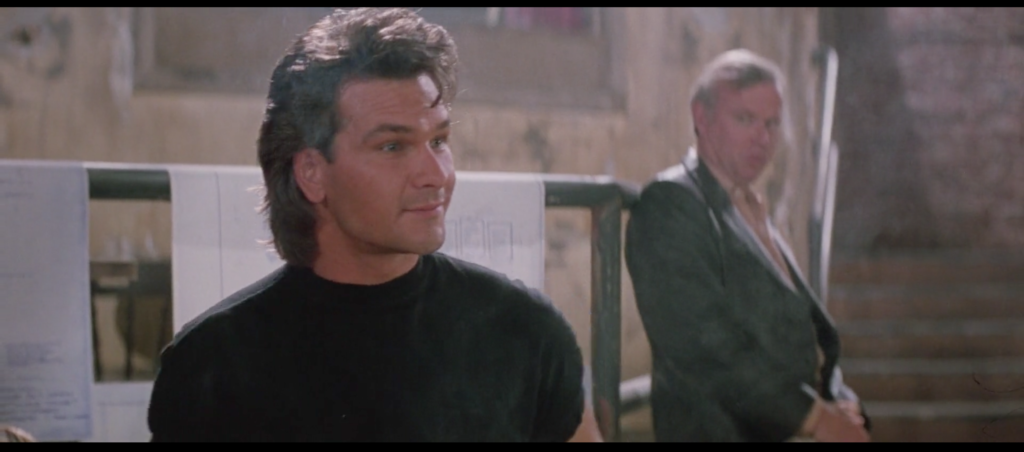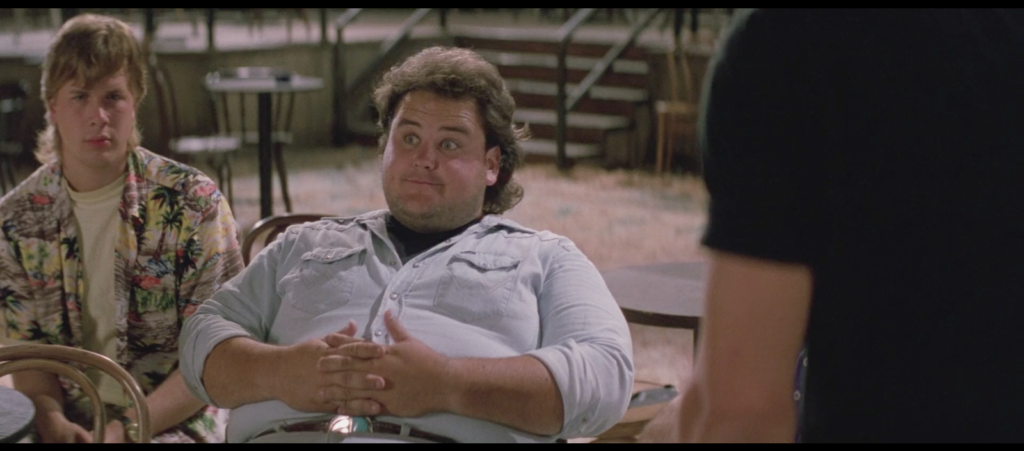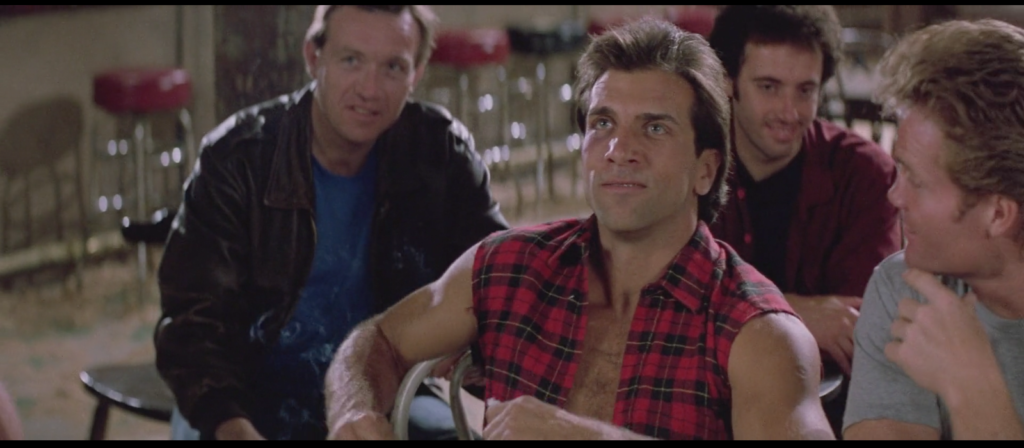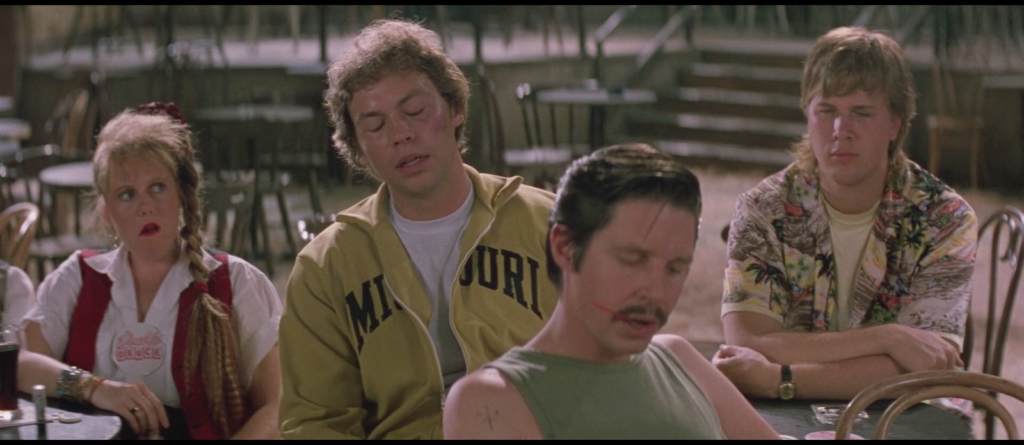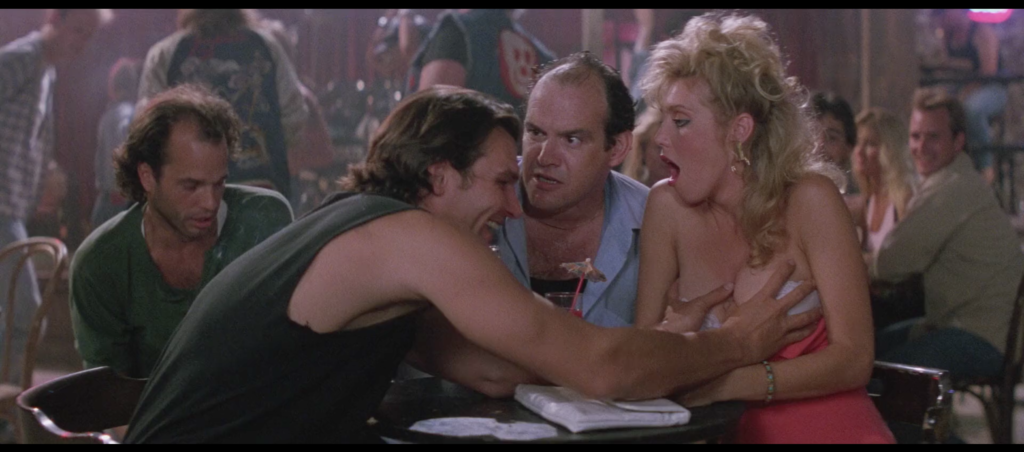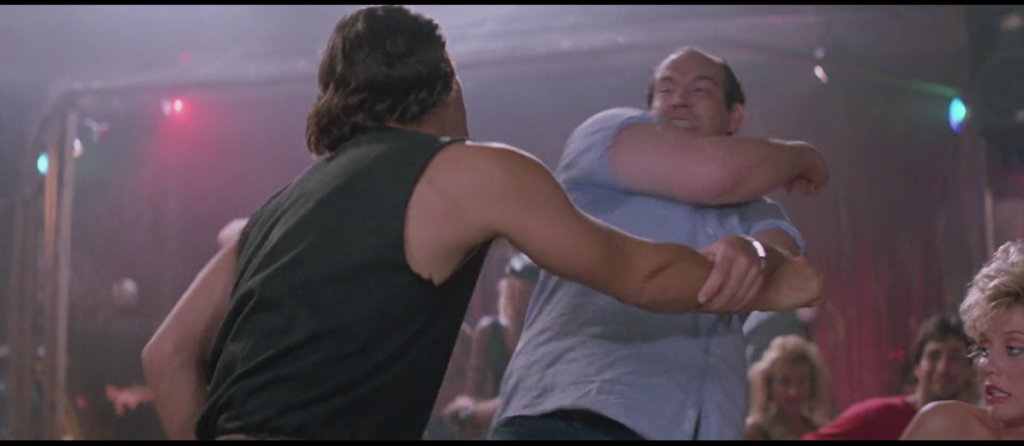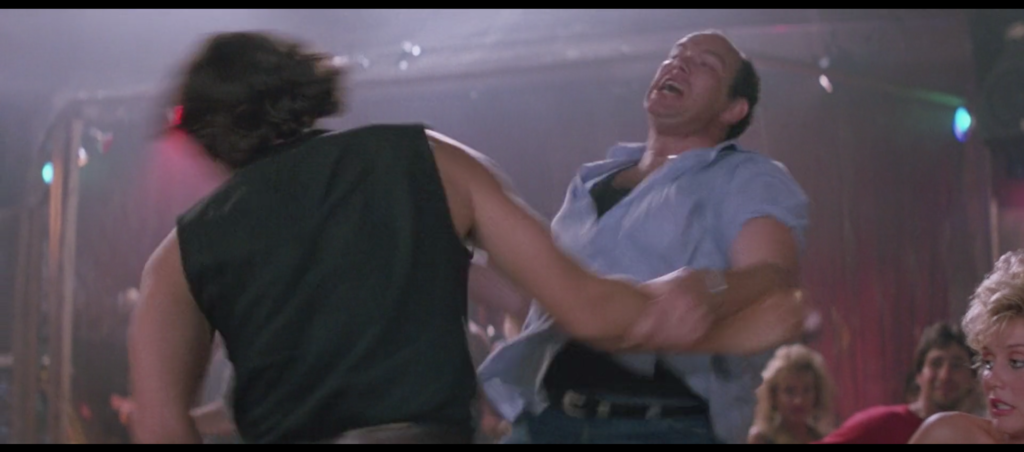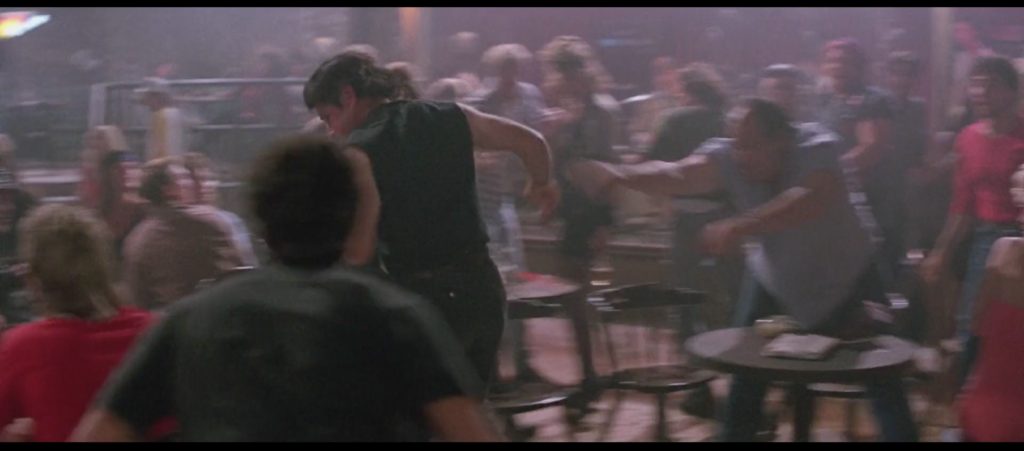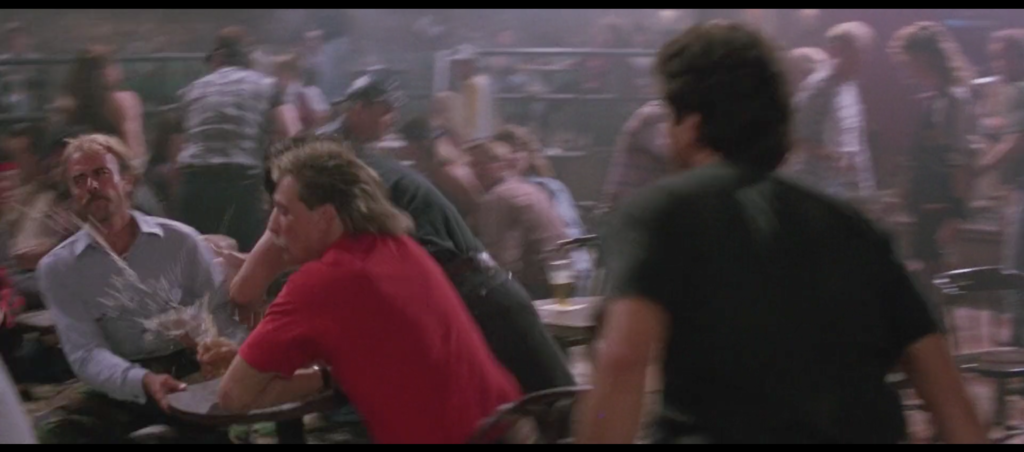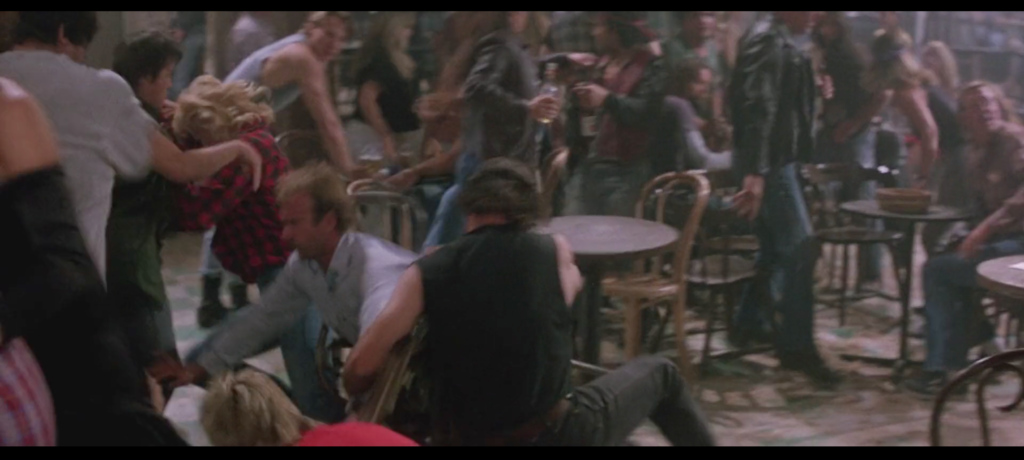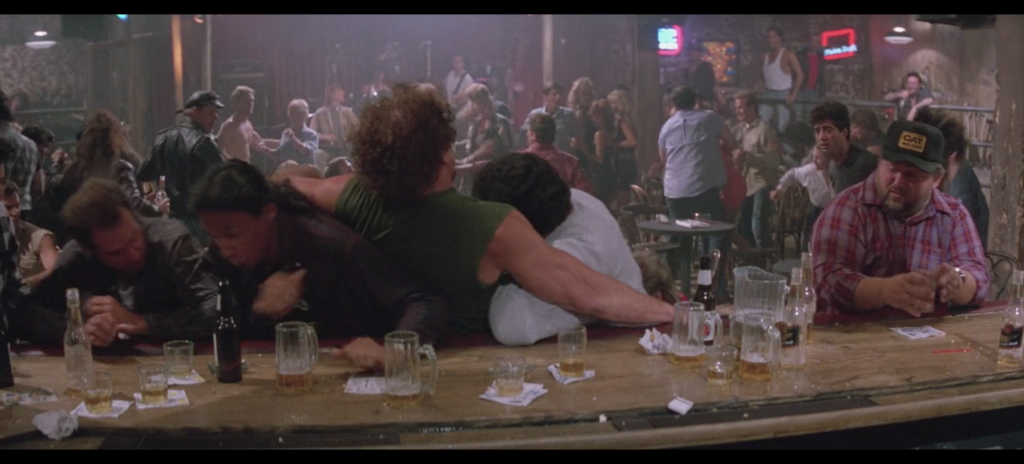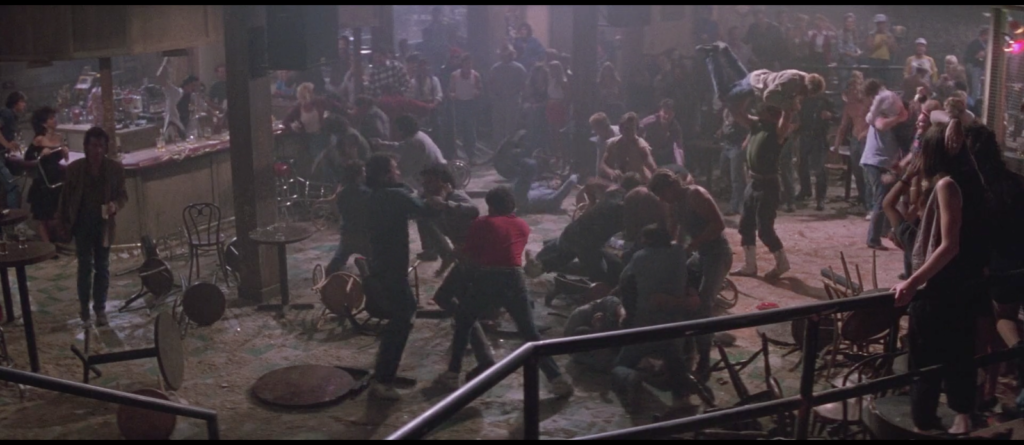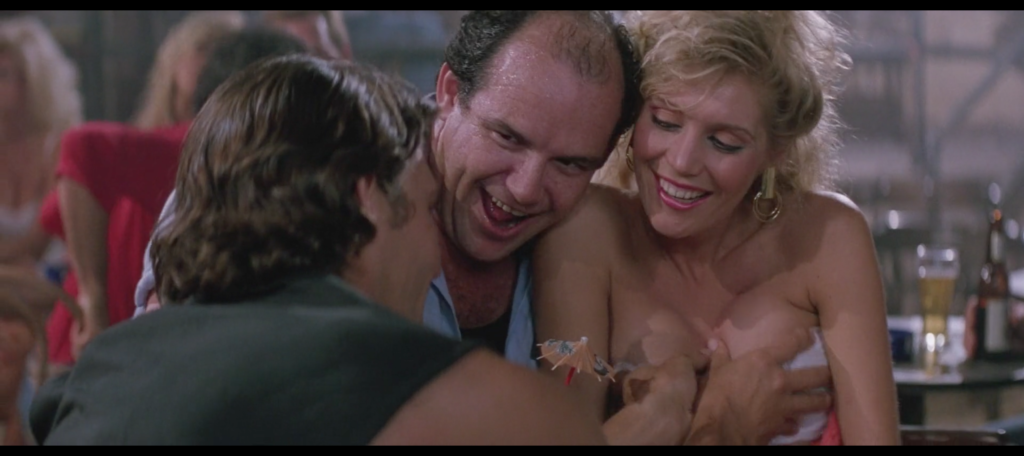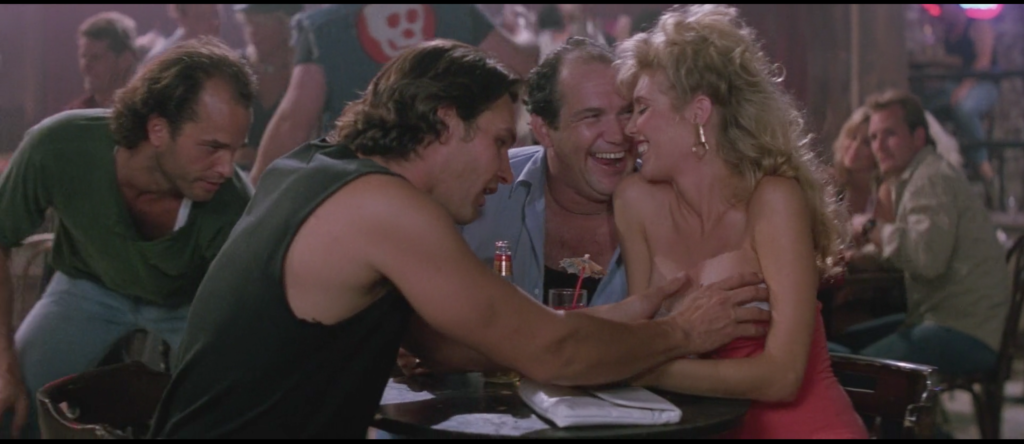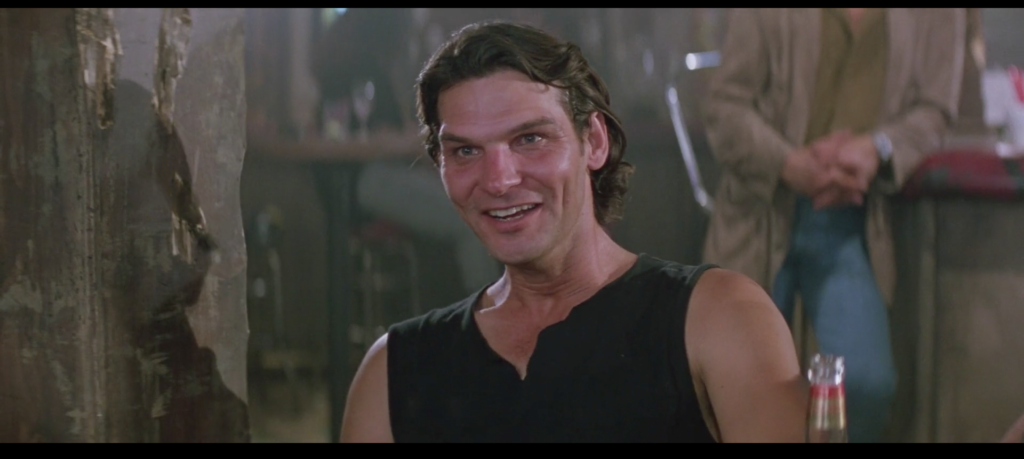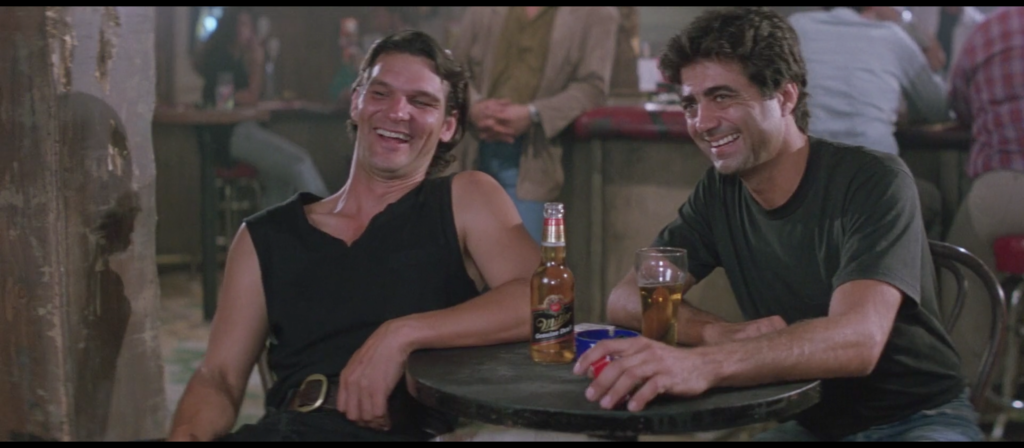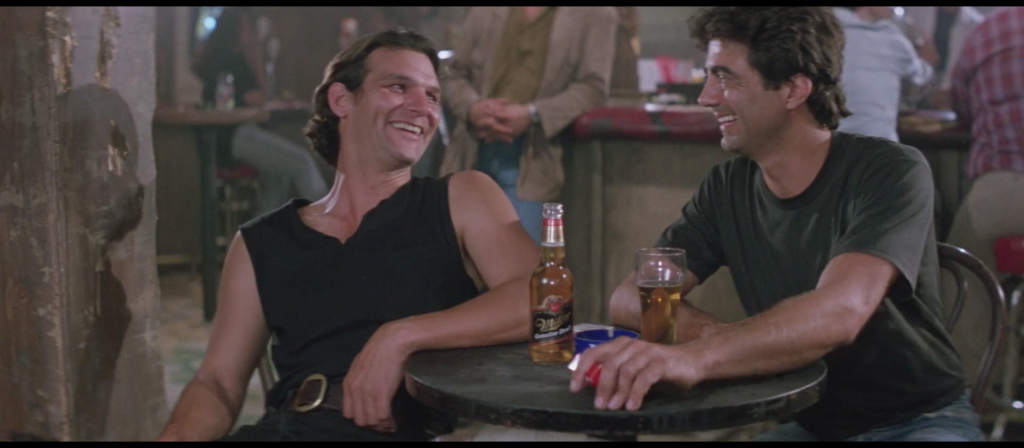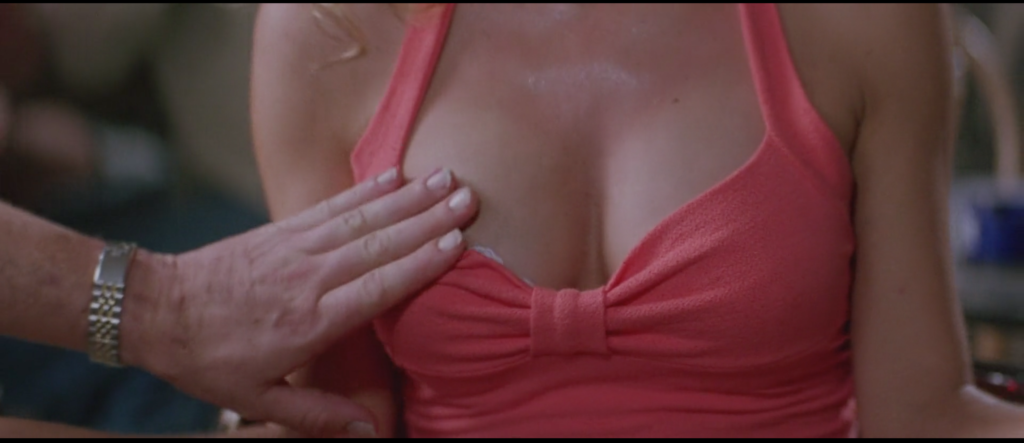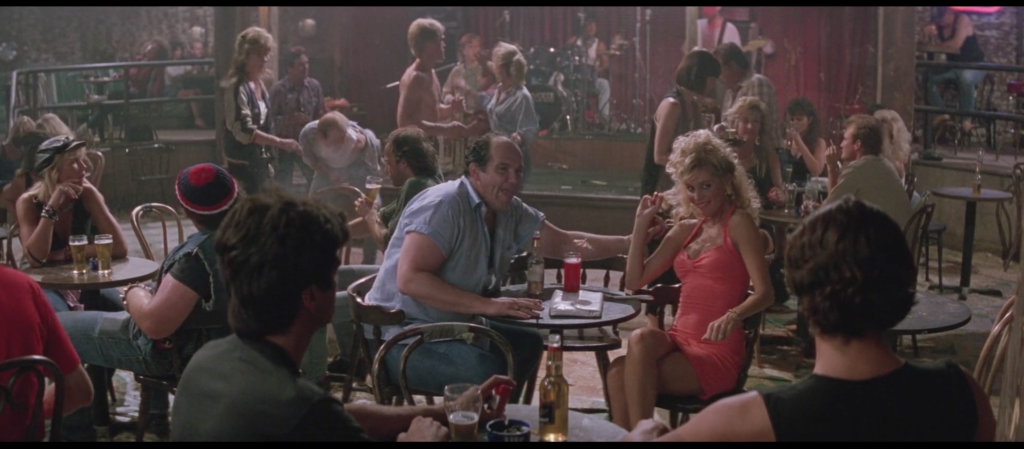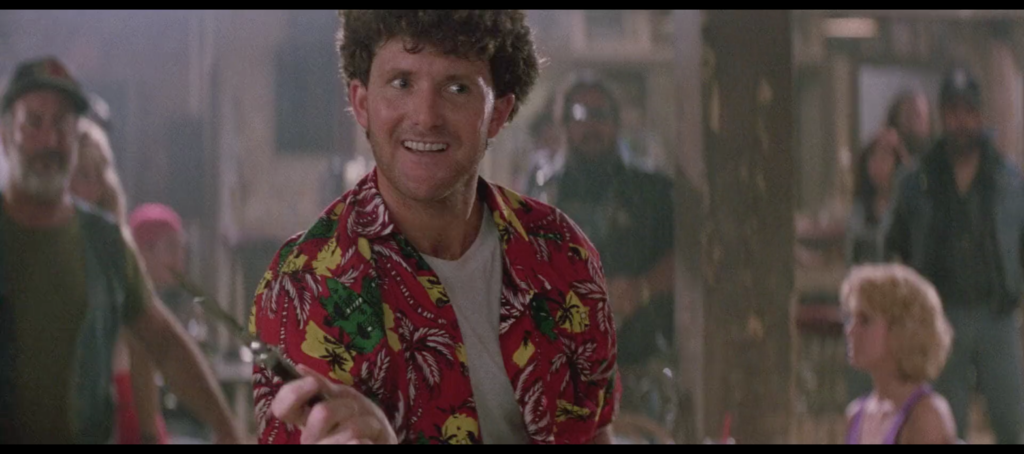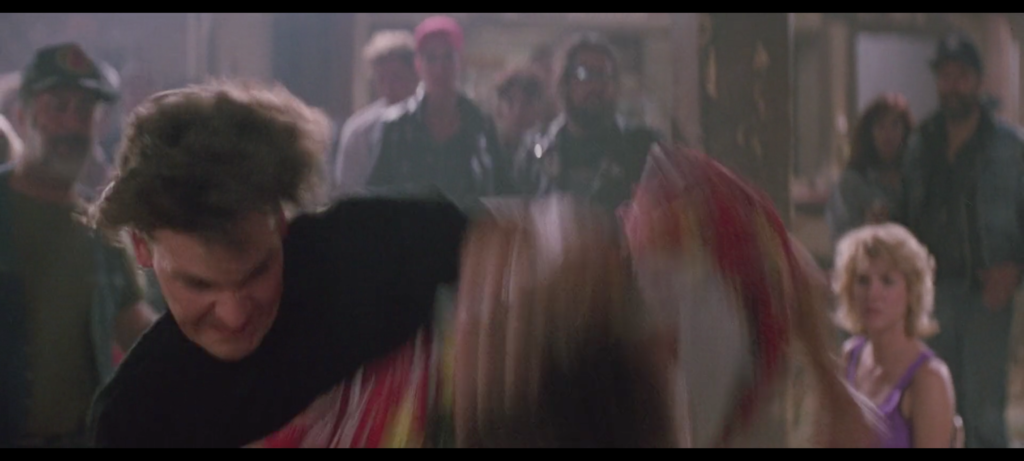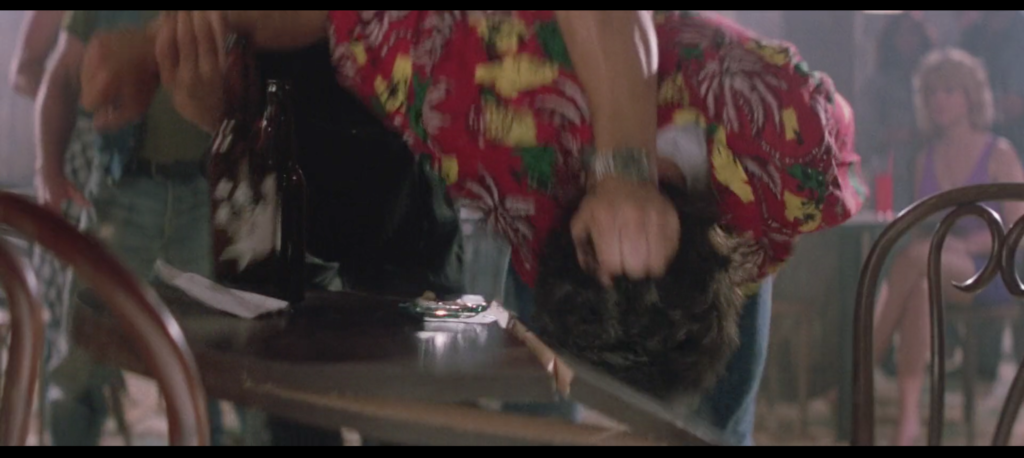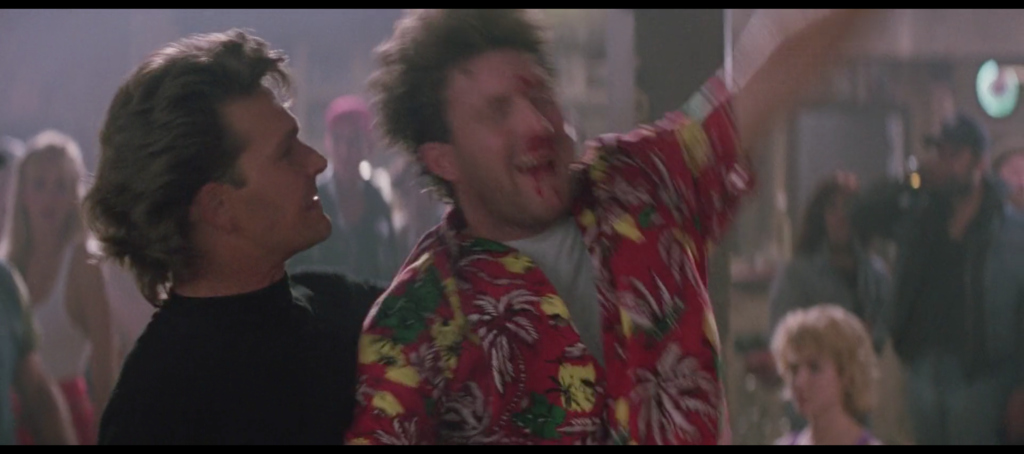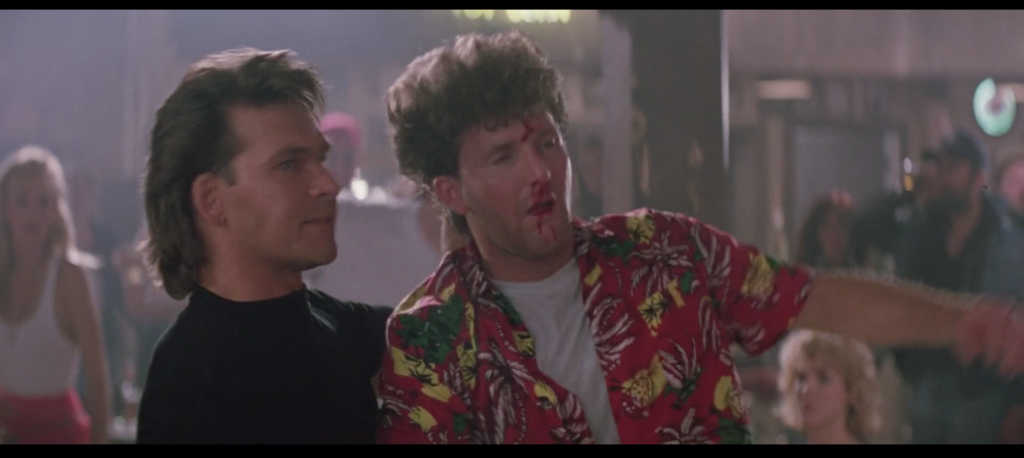Posts Tagged ‘the double deuce’
076. Foxworthy
March 17, 2019This fellow right here I call Foxworthy, for obvious reasons.
Now our man Foxworthy stands out in a crowd, even in a wretched hive of scum and villainy like the pre-Daltonate Double Deuce. For starters, he looks like a very famous comedian who within a few short years of the events of Road House will no doubt siphon up some of the spending cash freed up by the expulsion of several Double Deuce patrons. Aside from the lovely perms sported by the two other guys in the Jeff Healey Band and Dalton himself, he’s the only man in there for whom hair seems to have been anything more than an afterthought; “business up front, party in the back” is not an arrangement arrived at without some consultation with one’s barber. The mustache sets him apart as well, particularly when compared to the sorry situation taking place on the upper lip of Pat McGurn. Finally, at least where his appearance is concerned, he is wearing a bright red t-shirt, making him easily the loudest splash of color in the entire barroom. This isn’t because he plays a major role or has an actual speaking part or threatens someone with a knife over his table-dancing girlfriend or anything—as best I can tell it’s just because the costume department couldn’t be bothered to keep track of who was popping and who wasn’t.
But he mostly stands out because he grabs poor wonderful Carrie Ann by the waist and tugs her bodily towards him, spilling her drink tray and nearly getting punched in the face by her for it. Dalton sees this plain as day, as it’s one of the first incidents he comes across when he enters the Double Deuce for the first time. But his role at that point is simply one of observer. He intervenes no more than, say, Hank, who’s leaning against a pole a few feet away, perhaps thinking over his instructions from Horny Steve not to intervene in the fight erupting in the billiards area at approximately the same time. While like most of the early barflies Foxworthy simply disappears when Dalton starts cleaning the place up, he more than most deserves some kind of comeuppance for his transgression against Carrie Ann. Were it to have taken place just one week later probably would have earned his face an all-expenses-paid trip through a table. But Dalton’s non-intervention here establishes that, in his own later words, “It’s a job. It’s nothing personal.” Dalton will have occasion to break his own guideline in this respect many times over by the time the film is through, but for now, Foxworthy has no idea what kind of bullet he just dodged. You might say Foxworthy is unworthy.
071. The face of Frank Tilghman
March 12, 2019This is Frank Tilghman, looking at Pat McGurn just before he confirms that he’s firing him, per Dalton’s recommendation. We’ve talked about this scene before, or rather for some reason I wrote a parody of “The Ballad of John and Yoko” by the Beatles about this scene before. We’ve talked about Frank Tilghman’s fist and Frank Tilghman’s grin and Frank Tilghman’s POV and Frank Tilghman’s Buick. But I wanted to take a closer look at Frank Tilghman’s face in this moment. Actor Kevin Tighe spends the bulk of Road House playing Tilghman as though he exists in an entirely different movie; here he looks as if he has an entirely different movie within this one facial expression.
Maybe he’s just registering the gravity of the situation. Dalton has no idea who Pat McGurn is, or who is real boss is more to the point, but Tilghman knows, and Tilghman knows what firing him really means. He’s coming at the king and he’s afraid of missing. Two seconds after Pat’s departure however he’s cracking a dumb joke about how it was a good night at the bar because “nobody died,” which, talk about tempting fate. But all things considered I prefer a different explanation.
The kid had started out as a barback. By the time he applied for the big job Frank didn’t even care he was obviously lying about bartending school. Pat was a wonder to watch back there, thrumming with the energy of youth and seemingly oblivious to its sweat-stained beauty. The first time Frank made a move closing up one night he thought “Why, the kid’s trembling!” but it wasn’t the kid at all.
It was sex at first, sex and that’s all. But it blossomed into something rich and beautiful, despite the their backgrounds. Pat’s mother, Brad Wesley’s only sister, never escaped the streets of Chicago where Wesley himself came up. Tilghman never saw much of the city. State school, baseball scholarship. Bounced from job to job, mostly managerial, never embarrassing himself but never really distinguishing himself either. His folks were old when they had him and by the time they passed there wasn’t much to pass on. He stumbled bass-ackwards into the Double Deuce in the terms of his second divorce, taking it on from his ex’s family. She never really cared for it anyway, but he thought the place had charm, so why not? If nothing else the responsibility would keep him from spiraling the way he did after marriage number one went to shit. And if he could drink to keep the part of himself he could never admit even to himself at bay, well.
Funny thing happened along the way though. Frank fell in love with the place. Then he fell in love with Pat. Music at the Double Deuce, Cardinals games a few times a season. Together. Even stopped drinking, not in time to save the two marriages but maybe in time to do right by the kid and the place of business they shared.
Then things went south, and don’t they always. Frank should have known where the Double Deuce was headed the night he swept up his first eyeballs after closing. He should have known he was so besotted with Pat that he was looking the other way at the younger man’s involvement in the bad element. Money got tight. That bouncer Morgan he brought on, well, he only made things worse. Morgan got close to Pat and Frank wasn’t worried, if you knew Morgan for longer than five seconds you’d know it wasn’t that way for him, but the big man brought out the worst in the kid, and not just the mustache, though yes, the mustache. Funny how all his life Frank worried he’d get a reputation (“You will get a reputation” his mother had said when they found him with Jim Conniff that summer day long ago, and no more was said about the subject because no more needed to be said), when the reputation he should have been worrying about was the bar’s. Different bad reputations for sure, but bad either way. Worse this way, that was the bitch of it. He couldn’t help what he was and there were days, and nights, he thought what he was was beautiful. Not even he could make that mistake about the Double Deuce.
Money got tighter. Security was a joke. The budget for replacement furniture alone was skyrocketing. For a while he thought of simply asking for a cut of the coke sales in the restrooms but didn’t want to bring down the kind of heat that action tends to draw. And Pat…well, Pat was Pat. Kisses sweet with Jack and Parliaments but something he used to see behind those eyes just wasn’t there anymore, if it ever was. Now there was something cold there, something hard, something sly and shifty and shitty. Had it always been there? Had Frank always been too big a fool to see it?
Before long he was coasting on fumes. All the accounts were dry, and the taps were soon to follow. Then one night—and Morgan was standing there in the door the whole time, goddammit how could he have been so stupid—Pat approached him. Not like that, that was over, neither of them had said so because neither had needed to. (Mama would have understood that, he’d thought to himself with a chuckle that tasted like battery acid.) Maybe that would have come to a head eventually, maybe he’d have quit or Frank would have asked him to. Maybe.
But Pat, see, he had this uncle, fella name of Brad Wesley. Yes, the Fotomat. Yes, the ribbon-cutting at Pete Stroudenmire’s Wagon Days. C’mon Frank, you been in Jasper long enough to know Brad Wesley. Throws some good parties, yeah, inn’t that so Morgan? Anyways Uncle Brad, he’s a businessman, all kinds. An investor, you might say. Helping out people all over town, like that Red Webster cross the parking lot. He’s got some cash, for one thing. Liquor too, biggest distributor in the county. Three counties, that’s right Morgan, thanks man. Three counties, Frank! And he’s author-rized me to invite you to his place for breakfast Sunday. Oh you don’t need to know why yet, Frank. Let’s just say it’ll be worth hearing.
C’mon, Frank. For old time’s sake.
Then years and tears and eyeballs later, the second ex’s mother died and wouldn’t you know it, she was fonder of Frank than she’d ever let on. With that kind of money he could have just blown town, set up shop in the Keys, or hell, just retired there. But no, goddammit, no. Let Brad Wesley win? Let him finish doing to the Double Deuce what he’d done to Jasper? To Pat—this Pat-thing behind the bar, wearing Pat’s smell and laughing his laugh and as hollow as the foundation wood that time Frank’s old man showed him the termites? Seemed to Frank the termites had gotten their share, and more than. Seemed to Frank the time had come to, for once in his life, fight.
And he knew the name to help him do it. Everyone did. And was the man the named belonged to beautiful? Yes he was.
But Frank Tilghman had learned his lessons from the barback. This was not about love, or if it was it wasn’t that kind of love. This was a land-love, a legacy-love, a kind of love Frank Tilghman never felt more strongly than when he looked into the twinkling void Brad Wesley’s eyes and felt it slipping away. It was a love worth the fight.
But oh it was hard, firing Pat. Easy for the cooler maybe, but not for Frank Tilghman, no. No, it was hard and sad and a battery-acid bitch of a thing, and did he have any idea he still felt half this much, half this strong, about the man Pat used to be, the Cardinals game man, the Jack and Parliaments man, the man he’d trembled for? He did not. He felt that feeling inside of him, fighting to get out, pounding against this ears, his heart, his forehead, his hands, the back of his own eyeballs. Who’ll sweep them up, he thought, and fought back what seemed close to madness.
And the feeling caught the words in his throat and held them there. Couldn’t have seemed long to the others, maybe they didn’t even notice at all, but in that Miller Genuine Eternity of a moment Frank Tilghman did not know if they’d ever come out at all. Get out, then, Get out he heard himself say, and it was over.
Almost. He heard Pat’s laugh as he left like a distant thunder and it made him nervous. He cracked a joke, barely realizing what he was saying but realizing even as he said it that this was his last shared thing with that man, like he was giving him a reason to laugh that would travel back in time for him to hear, just to stop that laugh from being the cruel thing it was. The cooler spoke again then. It’ll get worse before it gets better, he said. In that moment Frank Tilghman thought he’d never heard a truer thing in his life.
068. “Opinions vary.”
March 9, 2019Morgan: “You know, I heard you had balls big enough to come in a dump truck, but uhh…you don’t look like much to me.”
Dalton: “Opinions vary.”
Morgan: […]
Morgan does not have the right temperament for the trade, but he does know a threat when he sees one. To a fault, perhaps. His biggest fault as a bouncer, aside from working for the local crimelord, is that he exists in a permanent state of bouncing. To Morgan, every customer is a peckerhead who’s been slugged in the gut and physically thrown through the front doors into the parking lot—they just don’t know it yet. Morgan’s great task in life is to be the one to inform them, with his fists. Witness the first thing he says to Dalton: “And if you’re not drinkin’, you’re outta here.” This is just after he ejected Mister Nipple to Nipple, and in the process upended a table and sent several perfectly pliant patrons of the establishment ass over elbows to the ground. You’d think he’d have bigger fish to fry, but no: The silent stranger with the magnificent head of hair is another threat waiting to be neutralized. Morgan is a preemptive strike in a sleeveless green t-shirt. Existing in this state of constant certitude—that everyone’s an asshole but you, and that it’s your job to pound that knowledge into them—makes Morgan ill-prepared to brook even the slightest dissent.
Witness the above exchange after Dalton’s first night visiting the Double Deuce. Morgan has just participated in a bar-wide fight that leveled nearly everyone and everything in its path; Dalton sat the whole thing out, observing from a distance and then meeting in Tilghman’s office for an off-screen tête-à-tête. So perhaps Morgan’s skepticism about Dalton’s martial prowess is warranted, though expressed it a needlessly condescending way.
To his credit, Dalton doesn’t even disagree with him, not explicitly. He neither confirms nor denies whether his balls are big enough to come in a dump truck, or whether he looks like much, or whether he is much. All he says is “Opinions vary,” and that’s enough to transform Morgan’s whole affect to a comical degree. (Terry Funk is a perform accustomed to playing to the cheap seats, after all.) He goes from a smirking prick to a puppy who just heard “Bad dog!” within about one second, all because Dalton suggested that points of view exist besides Morgan’s own. That’s it, that’s all it takes. If Dalton had walked right up and cold-cocked him it would have had less of an impact.
Aside from Dalton and Wade Garrett themselves, Morgan is by all appearances the most experienced bouncer in the film. Not for him, the Dalton Path. Not for Morgan, the Way of Wade Garrett. The Morgan Idea holds that Morgan is the master of everything and decides everything. Dalton’s simple statement that this is not so strikes at the man’s very soul; by resisting he has signed his own death warrant. That dump truck is barreling down the road toward him at 100 miles an hour, loaded for bear with Dalton’s balls, and he is constitutionally incapable of getting out of the way until he kisses the grill.
067. Table dancer
March 8, 2019“We don’t cause trouble, we don’t bother nobody.” Few of the barflies whose acquaintance either we or the staff of the Double Deuce have the good and/or mis fortune of meeting adhere to Rick the Ruler’s public proclamation of good behavior as closely as Table Dancer. Played by Sylvia Baker, she’s the character who dances on a table. Here are things that, based on the conduct of other barflies in the film, she could reasonably be expected to do instead:
- Pull a knife and threaten to stab someone at a moment’s notice
- Pull a knife and attempt to stab someone at a moment’s notice
- Pull a knife and actually stab someone at a moment’s notice
- Agree to grope a woman’s breasts for money without actually having the money
- Wallop the shit out of someone who groped a woman’s breasts for money without actually having the money
- Offer her breasts to be groped for money without first doing due diligence
- Have a fistfight on the floor with a sibling
- Propose getting nipple to nipple
- Lob a beer bottle at a blind man’s head because he says he has to urinate
- Laugh like an imbecile
- Drink until incapacitated
- Have sex with an employee in the storeroom
- Be part of a team sent by a local businessman to assassinate a bouncer
- Not wear a shirt
- Purchase and snort cocaine, though somehow not in that order
- Deface the walls with vulgar graffiti
- Locate the vehicle of a bouncer, slash all its tires, break its radio antenna, smash its windshield, and shove an entire stop sign through the window
- Say “dirtball” or “moose-lips”
- Wear a very loud shirt
All Table Dancer wants to do is gyrate spasmodically on a table to the Jeff Healey Band, occasionally lifting her skirt to show that her silver-black bodysuit goes all the way down. It’s her rat-faced boyfriend who decides this is worth committing murder in a room full of witnesses for, not her. She doesn’t even get upset when Dalton rams her boyfriend’s skull through furniture solid and steady enough for her to dance on. She’s just like “Oh! Party’s over I guess” and takes Dalton’s extended hand to climb down off the table, then looks him over like the snack he is as she leaves.
Table Dancer represents the joie de vivre to which the rest of the film’s barflies should aspire. Would Dalton have been so quick to send Hank in to break up the party if this were the worst of the behavior one could expect of the Double Deuce’s clientele? I think not. She falls victim to broken-windows policing more than anything else, like how Giuliani used to shut down all the clubs where black people went to listen to hip-hop to make the city safe for oligarchs, somehow. Am I saying Dalton gentrified and Disneyfied the Double Deuce?
Am I?
066. Frank Tilghman’s fist
March 7, 2019One thing I never noticed before starting this project, one thing I never noticed before tonight in fact, one thing I never noticed despite watching Road House dozens of times over the course of nearly fifteen years, is that when Brad Wesley’s goofiest goons, Tinker and O’Connor, come to the Double Deuce with Wesley’s nephew Pat McGurn to force Frank Tilghman to overrule Dalton’s decision to fire Pat under threat of physical harm and the cessation of liquor shipments to the bar due to Wesley’s control over distribution in the Jasper, Missouri metropolitan area, and Dalton expresses skepticism about the idea, and Pat almost instantly loses his fucking mind and attempts to slice Dalton open with a knife the size of a Little League baseball bat, and Dalton breaks his nose and tosses him through a plate glass window, and O’Connor assaults him and they both go tumbling through the place where the window used to be, and they fall first to a raised dais and then make their way to the main floor below after O’Connor bumrushes him over the railing, and Dalton pounds the crap out of him and eventually beats him unconscious, and doesn’t even bother to deliver a coup de grace, just kind of holds O’Connor up by his jacket for a moment and then drops him to the ground in disgust, and meanwhile Tinker, who during Dalton and O’Connor’s initial fight in Tilghman’s office punched Tilghman in the gut and then sliced Dalton open with his own knife and then punched Dalton in the face before Dalton kicked him in the chest for leverage to thrust himself and O’Connor through the window, meanwhile Tinker he suckerpunches Younger when he rushes through the door to see what’s going on, but then Hank comes in to help and he and Younger incapacitate Tinker and punch him in the gut while holding him still which is the kind of thing villains do but all’s fair in bouncing, and as Jack and Hank and Younger drag the punchdrunk bodies of their enemies through the bar and presumably to the exit, and Dalton is all covered in sweat and blood and getting ready to head out the back door and go seek medical attention, Tilghman, you remember him, Tilghman staggers over to the broken window and makes eye contact with Dalton and raises his right fist in a gesture of triumph and solidarity that’s one of the most ridiculously obsequious things Tilghman does in the whole movie, which in the parlance of our times puts it in the running for most ridiculously obsequious thing worldwide, I mean Tilghman contributed nothing to the fight, he just got winded by Tinker until he was rescued by the other bouncers, but there he is, small business owner, vicariously victorious in his non-worker role, and Dalton gazes into the fist of Frank Tilghman, as he raises that five-sided fistagon, as the bodies get dragged away.
065. “He killed a guy once. Ripped his throat right out.”
March 6, 2019When Frank Tilghman traveled to New York (City?) to hire the (second) best damn cooler in the business and also cast humorous aspersions on the size of his penis, we in the audience pretty much had to take his word for it. Dalton has great hair, a great body, a cool as ice demeanor, the ability to dupe Knife Nerds into leaving a bar of their own volition, and the stomach to stitch up his own knife wounds, yes. But actual bouncing? No evidence of that just yet, much less enough to decide that this lion-maned man is a one-man army in a throwdown.
Conveying just what Dalton is capable of in the clutch (literally) falls to Hank, the Double Deuce’s resident Dalton fanboy. When Dalton first arrives and word of his identity gets around—he tells Carrie Ann and Pat McGurn overhears and thus the legend is spread—the bar’s staff are all aflutter, some with excitement, some with skepticism, some with…whatever emotion covers “shit, I’m not going to be able to steal from the cash register/beat up patrons at random so easily anymore.” Hank is on the excitement end of the spectrum.
“He killed a guy once,” Hank tells his fellow bouncer Horny Steve as they lounge against a wooden post while wearing what would, if combined, amount to nearly one whole shirt. Hank shoots his left arm forward across their bodies, then pulls it back hard, raking his clawed fingers against the air just in front of Steve’s neck. “Ripped his throat right out,” he explains. He sounds like he’s talking about Regina George.
Our man Steven is unconvinced. “Bullshit,” he replies, only he pronounces it in that great movie-hardass way: “Bull shit,” two words, like the t-shirt the kid wears in The Jerk. And for all we know, Steve has the right of it. The way people have carried on about Dalton in this movie so far, there’s no telling what he’s actually capable of on the one hand, and how much his reputation has been exaggerated by the awestruck barfolk of the world. After all, Carrie Ann the extremely cool waitress recognizes his name instantly and reacts like she’s just realized she’s been making small talk with INXS’s Michael Hutchence. People are bowled over by this dude.
Also, and I think this is crucial to understanding a lot of what goes down in the first act of the film, nearly everyone we meet is very stupid. Dalton’s not and Tilghman’s not, that much is clear. But by the time the film hits the 15-minute mark, a grand total of nine words longer than two syllalbes, and zero words longer than three, have been uttered; of those nine, one is “peckerhead” and another is “attitudes.” It’s not difficult to imagine convincing Hank here that Dalton is bulletproof.
But even an extremely dumb clock tells the right time twice a day.
063. Patrick Swayze Beating the Shit out of John Doe from X
March 4, 2019Road House is a film in which Patrick Swayze beats the shit out of John Doe from X.
It’s simple, really. Sister-son Pat McGurn returns to his former place of employment with his uncle’s most useless enforcers O’Connor and Tinker in tow in order to force proprietor Frank Tilghman to reverse the decision of the bar’s new cooler Dalton and reinstate him to his position of bartender. Dalton takes very mild issue with the plan. Pat whine-gloats like a petulant child who thinks their parents are gonna punish their little brother and not them, then produces a knife the size of a machete and proceeds to simultaneously slash at and gay-panic taunt Dalton. Dalton punches his nose in. While he holds his hands to his broken face and howls in pain, Dalton spin-kicks him through a plate-glass window. He remains incapacitated for the duration of the fight that ensues, after which he is bodily carried out of the bar.
Concerned that Pat McGurn didn’t receive enough punishment? I’ve got you. First it’s important to note that by the end of the film Dalton will murder Pat McGurn, using the body of a dying goon to block Pat’s shotgun blast, then withdrawing the knife he’d inserted into the now dead goon’s gut and throwing it into Pat’s chest, causing him to misfire one last time and then plummet from a second-story landing to the ground below. Second you’ll notice from those screenshots that Pat’s nose was already bleeding before Dalton’s punch connected; you can call this slapdash continuity if you want, but I prefer to believe that either his body anticipated the damage that was about to be done to it and started hemorrhaging spontaneously, or that Dalton caused him to bleed without touching him by sheer force of chi. Or both! I’m not picky.
But here’s the bottom line, friends: Road House is a film in which Patrick Swayze beats the shit out of John Doe from X.
062. Sears
March 3, 2019Some lines punch above their weight class. You know what I mean? You can feel them searing their way into your brain and then lodging there, as close to permanently as anything can in a world that feels like a blow to the head every day, despite them not being important or funny or even good. One of those quote-tweet audience-response twitter threads went around recently to this effect, asking what obscure movie lines have become a part of your everyday vocabulary or thought patterns. My personal choice, besides the obvious, is a woman at a dinner party in Hellraiser squawking “Doctors!” in this over-the-top, probably dubbed-to-replace-an-English-accent what a world way, and her husband responding with a “That’s right, honey” so patronizing it makes your eyes water.
I can currently feel this happening with poor Jack, that’s him on the right above, trying and failing to prevent his fellow bouncer Horny Steve from allowing two young women below the legal drinking age from entering the Double Deuce with IDs so woefully inadequate to the task of age verification that they aren’t even fake. “This is a Sears credit card” he tells Steve, who’s in the middle of greeting his lady friends Beverly and Agnes and could not possibly care less. I feel it searing, and I swear there was no pun intended. I feel it becoming the way I react to any frustratingly bogus situation or nonsensical explanation, like the pet-shop clerk who tells Parker Posey “This is least like a bee of the ones that we have here” when she’s desperately searching for a replacement Busy Bee for her dog in Best in Show, or Kramer and company shouting “These pretzels are making me thirsty!” in Seinfeld. Car says it’s out of gas even though it previously said there were forty miles left in the tank? This is a Sears credit card! Laptop won’t remember a password I’ve entered in a million times? This is a Sears credit card! Politics??? This is a Sears credit card! I will never see the softer side of Sears again. I accept this.
061. The Third Rule, Verse 2
March 2, 2019“This is the new Double Deuce,” says Frank Tilghman. We are at the start of an all-hands staff meeting, and Tilghman is pointing to the concept art for the bar’s redesign. But standing nearby is his latest hire, Dalton. It is through Dalton, with Dalton, in Dalton that the new Double Deuce will be achieved. Dalton embodies the new Double Deuce. He is its future.
When Dalton takes over as cooler he becomes more than just the chief bouncer. His role is not to handle a series of discrete incidents, but to institute sweeping reforms that will eliminate such incidents forever. “It’s going to change,” he states—not a threat, not a promise, a fact. His bouncers, too, must change for this to take place. As below, so above.
Bouncing on the Dalton Path is a matter of following “three simple rules.”
This, again, is the third.
3. Be nice. (continued)
When first we assayed the Third Rule, I said the following:
It is the shortest rule, and it requires the most explanation. It is the least practically minded rule, and it is illustrated with the most practical applications. It is a rule about being kind to others, on the surface at least, and it is the rule greeted—and at times delivered—with the most open incredulity, even hostility.
When Dalton tells the assembled staff of the Double Deuce to be nice, it is Jack the bouncer who, whether in spite or because of being Dalton’s best student, opens the door for doubt. “Come on,” he says, gently but with unmistakable disbelief. He’s trying to ask his new sensei “Are you out of your mind?” in the politest possible way.
Now comes the yin-yang instructional configuration that should be familiar to us as central to the Giving of the Rules. Dalton leans forward and tells Jack “If somebody gets in your face and calls you a cocksucker, I want you to be nice.” Jack responds with a skeptical “Ohkayy”—and, though he knows it not, passes the test Dalton has just given him in so doing. Dalton got in his face and called him a cocksucker, and he was nice. It takes the doing of the thing to see that it can be done and learn how to do it. If you think this sentence is confusing, then change one pig.
(to be continued)
054. The Ballad of Pat & Tilghman
February 23, 2019Standing in the bar down in Jasper
Sweeping up the eyeballs for thrills
My bartender’s Pat
Hey, at least I have that
Until when Dalton said he’s skimming the till
Christ, you know it ain’t easy
You know how hard it can be
A man named Brad Wesley
He’s gonna crucify me
Finally found myself with some money
Thought I’d fix the place up just right
Dalton helped me to learn
That my man Pat McGurn
Costs me about a hundred-fifty a night
Christ, you know it ain’t easy
You know how hard it can be
A man named Brad Wesley
He’s gonna crucify me
Pat McGurn’s the son of Brad’s only sister
Canning him’ll take me some nerve
I may own the bar
That only takes me so far
Cuz Mr. Wesley owns the liquor I serve
Christ, you know it ain’t easy
You know how hard it can be
A man named Brad Wesley
He’s gonna crucify me
Wesley takes my money almost every day
“Jasper Improvement Society”
It’s his town he said
Oh boy when he’s dead
The killers will be four men who are old (Tink)
“Take the train, consider it severance”
Pat looks at me raising his brow
Incredulous Pat:
“I didn’t hear you say that”
I stammer “Well, I’m sayin’ it now”
Christ, you know it ain’t easy
You know how hard it can be
A man named Brad Wesley
He’s gonna crucify me
Pat McGurn’s my headcanon lover
Firing him makes me start to pout
His voice is a purr
When he asks “are you sure”
Takes all I have to whisper “get out”
Christ, you know it ain’t easy
You know how hard it can be
A man named Brad Wesley
He’s gonna crucify me
A man named Brad Wesley
He’s gonna crucify me
052. Boot knife gleam
February 21, 2019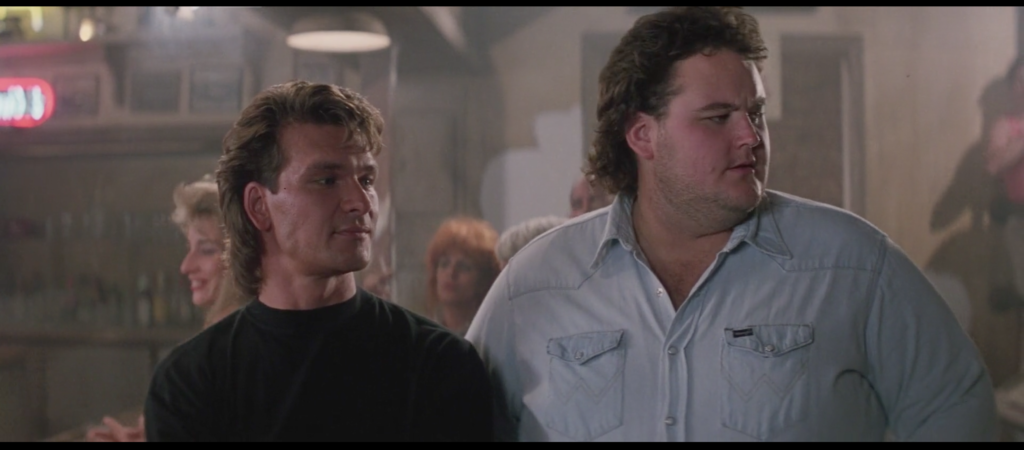
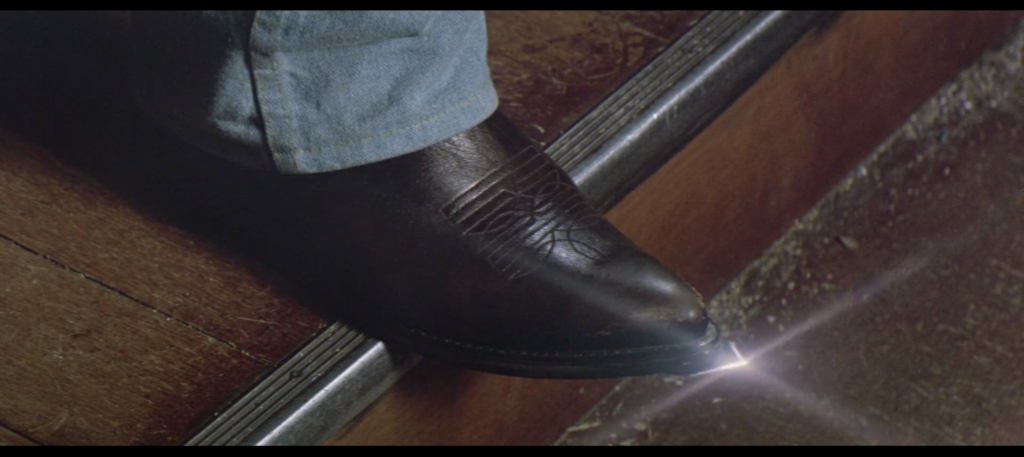
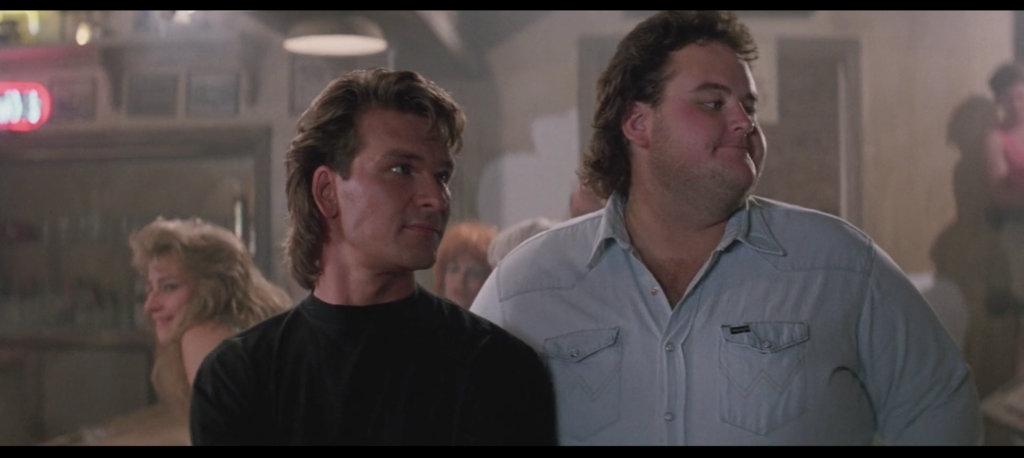
They added a gleam effect to the knife in the boot on the leg of the goon who tries to high-kick Dalton in the head with his knife-mounted boot. Just in case, you know. Even with the closeup—an eyeline match cut from Dalton and his Padawan learner Jack to the boot and then back again (Dalton: “Right boot.” [pause for boot] Jack: “Got it.”)—the audience could have missed it, primarily because even for the kinds of people who might want to watch Road House boot-mounted knives are not the kind of thing you’re trained to spot in the wild. Can’t be too careful, really.
No, really. Let’s review. Never underestimate your opponent. The opponent here is the audience’s inability to recognize a knife sticking out of a Knife Nerd’s shitkicker. Expect the unexpected. You wouldn’t expect someone to miss the knife when it’s one of three things on screen, the other two being the boot and the jeans covering the leg part of the boot, would you? Take it outside. Step beyond the boundaries of yourself and see things through the eyes of others. Never start anything inside the bar unless it’s absolutely necessary. The trouble here started when Brad Wesley, outside the bar, ordered this man to go inside for the express purpose of necessitating violence. Be nice. Dalton’s simply points out the location of the weapon to Jack rather than raising holy hell, a first move echoed when he amasses his bouncers, approaches the boot knife goon with a smile, and simply says the bar is closed. Until it’s time to not be nice. The arrival of the boot knife is the big hand reaching Not Nice O’Clock.
That gleam is not just the light reflected off some jackass’s dopey weapon. It’s Dalton’s bouncer-sense made visible.
051. Tableau III (Nipple to Nipple)
February 20, 2019Here in the Double Deuce, after Dalton’s arrival, prior to The Agreement and the subsequent bar-destroying brawl, things are proceeding as one assumes they always proceed. Denise, Jasper’s sole indication that there is a non-Jasper culture out there to which one can aspire, glides up to the bar to ask Pat McGurn (John Doe, cofounder of X, lest we forget) for a “vodka rocks.” Enter the Barfly, and this is actually how he’s credited, “Barfly,” played by Frank Noon. In a film teeming with barflies he is selected as the representative specimen. This absolute slob, I mean maybe the most gormless motherfucker in the whole film, this asshole sidles up to her and says “Hey, Vodka Rocks, what do you say you and me get nipple to nipple.” I hesitate to call this pickup line a euphemism, because it’s actually much more vulgar than describing the sex act outright. Getting nipple to nipple is a phrase that can only make one feel bad about having sex, or wanting to have sex, or being capable of having sex, or being part of a species that propagates itself by having sex. It embarrasses me anew every time I hear it. Goof coming out of his well armed with his quip to slutshame mankind. Point is it’s not happening for this turkey. Denise looks down in contempt, unconsciously mirroring the way Dalton, whose hair is only slightly less magnificent than hers, looks down in disapproval. Then she looks up and, this being Road House, shoots the guy down in the strangest possible way. “I can do that without you,” she says, before turning away and giving Dalton an appreciative once-over (more like a thrice-over actually, she is hot to trot for our hero) in the process. The reasonable interpretation of this rejoinder is that Denise can somehow aim her breasts at one another so that her nipples can touch, a pincer movement if you will. I choose to believe she thought fast and decided to shoot this goofy down by saying something even weirder than he did. Either way, and I hope you’re sitting down for this, he does not take rejection well. See Morgan back there? He’d been leaning on the bar in the background unseen until the dirtball mooselipped chickendick made a pass at Denise. (Do people make passes at other people anymore? When I was a kid Three’s Company and The Golden Girls had me believing that’s all anyone did as an adult. “He made a pass at me” is something I’ve never heard a human being say outside of a multi-camera sitcom. Anyway) The moment after “nipple to nipple” dribbles out of his mouth, Morgan pops into the frame from behind, like a fucking jack-in-the-box. It’s one of my favorite little moments of abject stupidity in the movie. On his worst day in the ring, Terry Funk couldn’t oversell a bump half as hard as he oversells Morgan overhearing someone hit on his secret boss’s girlfriend and getting mad about it. Of course Morgan is always mad. He’s an orneriness elemental. And he puts it to good use when Mr. Nipple angrily grabs Denise by the shoulder. Morgan grabs him by the shoulder, punches him in the gut, and tosses him into a table full of patrons, spilling him and them and the table and the drinks on it and several bystanders to the ground in the process. Why this doesn’t lead to an apocalyptic bar-wide battle royale is beyond me given that The Agreement ends in a nearly identical fashion, but at the very least it gives Dalton, serene and detached, an eyefull of Morgan’s modus operandi. This is clearly a bouncer who will need to be bounced. So! Beautiful, slightly weird woman. Ugly, very weird man. Angry, very angry bouncer. Knocked-over tables. Knocked-over patrons. Pat McGurn. The malign influence of Brad Wesley behind it all. Dalton has just gotten nipple to nipple with the Double Deuce. It’s not pretty.
050. The Third Rule
February 19, 2019“This is the new Double Deuce,” says Frank Tilghman. We are at the start of an all-hands staff meeting, and Tilghman is pointing to the concept art for the bar’s redesign. But standing nearby is his latest hire, Dalton. It is through Dalton, with Dalton, in Dalton that the new Double Deuce will be achieved. Dalton embodies the new Double Deuce. He is its future.
When Dalton takes over as cooler he becomes more than just the chief bouncer. His role is not to handle a series of discrete incidents, but to institute sweeping reforms that will eliminate such incidents forever. “It’s going to change,” he states—not a threat, not a promise, a fact. His bouncers, too, must change for this to take place. As below, so above.
Bouncing on the Dalton Path is a matter of following “three simple rules.”
This is the third.
3. Be nice.
The three simple rules for bouncing my Jasper road house all contain and account for their own direct contradiction. More than that, they depend on the aspirant’s ability to formulate that contradiction to be fully understood. Thus “Never underestimate your opponent; expect the unexpected” conveys both that chance will always break in the enemy’s favor and that a true brother bouncer—the unmentioned ally in a rule nominally covering the adversary—leaves nothing to chance at all. “Take it outside; never start anything inside the bar unless it’s absolutely necessary” is as much about one’s headspace as it is about one’s physical space, such that participation in a fight that takes place within the building is a requisite condition for obeying the rule in the first place. Even Dalton’s prefatory statement “All you have to do is follow three simple rules” is best thought of through the formulation of the philosopher Linda Richman: They are neither three nor simple nor rules nor followed.
So. The Third Rule. It is the shortest rule, and it requires the most explanation. It is the least practically minded rule, and it is illustrated with the most practical applications. It is a rule about being kind to others, on the surface at least, and it is the rule greeted—and at times delivered—with the most open incredulity, even hostility.
All this is necessary. One must see the complicated clockwork mechanism behind the simplest maxim. One must learn that on the Dalton Path, all philosophy is applied philosophy. One must be goaded into anger to understand the nature and value of its opposite. These things the Third Rule anticipates, mandates, births into being. This simplest of the three simple rules is alone in meriting a fuller and more complex reformulation from the Giver of the Rules, a new testament to unlock the old. It is the Great Commandment. It is not come to destroy, but to fulfil.
3. Be nice…until it’s time to not be nice.
to be continued
048. The punchline
February 17, 2019For want of a nail the shoe was lost.
For want of a shoe the horse was lost.
For want of a horse the rider was lost.
For want of a rider the message was lost.
For want of a message the battle was lost.
For want of a battle the kingdom was lost.
And all for the want of a horseshoe nail.
—traditional
“Hey buddy, what are you doin’? Are you gonna kiss ’em or not?”
“I can’t!”
“What do you mean, you can’t?”
“I ain’t got twenty bucks!”
—Road House
This concludes “The Agreement,” a seven-part special Valentine’s Week series. Thank you for reading.
047. A Dream
February 16, 2019Part Six of “The Agreement,” a special Valentine’s Week series
The Agreement is as follows: For the price of twenty bucks (specifically ten a kiss, though the phrasing of The Agreement implies that each breast is to be kissed once rather than one breast kissed twice), Gawker may kiss the breasts of Well-Endowed Wife, with both her and Sharing Husband’s enthusiastic consent. Gawker’s consent to The Agreement appears—appears—to be no less enthusiastic. On the contrary, it’s possible that at the moment he says “ARE YOU KIDDING?!?” no one has ever been more enthusiastic, about anything.
The Agreement brings forth a spirit of joie de vivre in all who participate in or observe it. Gawker, hands full of Well-Endowed Wife, is happy. Well-Endowed Wife, liberally coated with Gawker, is happy. Sharing Husband, by name and by nature, is happy. Heckler…well, Heckler looks like he’s watching The Agreement be fulfilled primarily to keep himself from sliding off the face of the Earth, but whatever part of his brain still functions certainly seems to be happy.
The Agreement is not only happy, however. The Agreement is sweaty. Get the most high-resolution copy of Road House you can find, get a good look at our cast of characters in this scene, and you can smell the salt of physical exertion, the alcoholic tang of beer-induced perspiration, the slightly acrid pit-stink from Gawker’s sleeveless underarms, the how-about-this-heat hail-fellow-well-met forehead dew of a jocular neighbor who seems to be more barbecue grill than man during the warmer months of the year on the noggin of the Sharing Husband, the chemical (or alchemical, if you happen to swing this way and be moved by this kind of thing) interaction between Well-Endowed Wife’s perfume and hair product and moisturizer and makeup her own body’s barely perceptible production of its natural coolant.
What I’m trying to say about The Agreement is that they’re not just having fun, they are into it, man. The absurdity of the whole situation masks this somewhat. My advice? Don’t let it.
Enter the Double Deuce on its own terms. Treat the concerns of its patrons and staff as valid and real. It’s what unlocks the whole film, turns it from “so bad it’s good” to, to, to this. It’s like knocking down some drywall and finding a whole other room, or like finishing The Hobbit and discovering the existence of The Silmarillion. Road House can be enjoyed in any number of ways but the rewards of this approach are—I was gonna say immeasurable, but all of us can count to 365. I know I can. And here, on day forty-seven, you can read the rewards of The Agreement all over its participants’ smiling faces.
Unfortunately, when it comes to the success of The Agreement, there’s only one measurement that counts: twenty American dollars.
Remember these moments, friends. Remember this sweathog happiness. Remember what we had, and could have had, before the bill comes due.
There was a time when men were kind
When their voices were soft
And their words inviting
There was a time when love was blind
And the world was a song
And the song was exciting
There was a time
046. Tableau II
February 15, 2019Part Five of “The Agreement,” a special Valentine’s Week series
I’m sitting in a bar writing this. The bar’s name is Duggan’s. Duggan’s is one of five Irish pubs within a one block radius of my apartment. (Jameson’s, McCarthy’s, Cork & Kerry, and Fallon’s are the others. Arps Tavern too, if you wanna get a little creative with your geography. This does not include the five non-Irish non-pub restaurants with a liquor license in the same area.) What you’re seeing above is not a scene that takes place at Duggan’s, young and dumb and full of cum as its clientele often is. On the kinds of nights when people who are young and dumb and full of cum go out and socialize, anyway. It’s otherwise the province of the shrieking Irish-American racists whose every breath is a betrayal of the Irish liberationary socialist tradition they all believe they support, sans the socialism. Anyway. Duggan’s boasts a relatively genteel crowd even at its most raucous compared to McCarthy’s, the bar whose parking lot abuts my apartment building. I’ve stepped inside there a grand total of once, to see if anyone belonged to the car in the lot with its headlights on. (They did not. At least not that they could remember.) McCarthy’s produces a nightly brawl like Kander & Ebb. I wish I were kidding. Every single night there’s some…what is the Long Island Irish equivalent of the word “guido”? because there really should be one, and “paddy” doesn’t quite cover it. Anyway—every single night there’s some moronic Hibernian, some bog person whose great-great-great-grandma snuck past Ellis Island despite Thomas Nast’s best efforts, screaming “HOLD ME BACK BRO, HOLD ME BACK BRO” or “MY FUCKING SISTER BRO, MY FUCKING SISTER” or “COME BACK COLLEEN, COME BACK COLLEEN” at the top of his lungs about fifteen away from MY HOME where my wife-to-be sleeps and my children play with their toys. McCarthy’s is the kinda place that they sweep up the eyeballs after closing. That’s not where I’m, currently, at. The distinction I’m attempting to draw is that what goes on at the Double Deuce during our first visit to the Double Deuce is intended to be unique to and representative of the Double Deuce. So let’s revisit the image above, and let’s do it from right to left, like we’re reading manga or the Torah. You have Well-Endowed Wife, eyes closed and smiling, thrilling to the sensation of a gormless stranger’s hands on her tits and her husband’s attention and affection resulting from same, I mean she’s transported by it. You have Sharing Husband, cackling with glee, simply could not be happier and more entertained by the spectacle of other men enjoying his wife’s body and his wife’s body enjoying other men. You have Gawker, now and forever Groper just like Donald Merwin Elbert became now and forever The Trashcan Man when he blew those oil tankers in Powtanville (Hey, Trash, what did old lady Semple say when you torched her pension check?), as riveted by this woman’s tits as the first men on the moon were by the earthrise. And—and this is key—you have Heckler, played by Charles Hawke, previously remarkable in this film for hollering “HEY YA PAID TA PLAY PLAY!” AND THROWING A excuse me and throwing a beer bottle at the Jeff Healey Band for the crime of announcing they’re going to take a brief break to urinate in the bathroom rather than piss themselves on stage, and throwing it with sufficient force to shatter it against chickenwire looser than Steve the bouncer’s ID requirements, and saying this with Noo Yawk accent that makes about as much sense in its Jasper, Missouri setting as the idea of famous bouncers, and I’m sure we’ll return to him eventually, but for now let’s look at this miserable bastard, transformed by the spectacle of the tripartite Agreement between Sharing Husband, Well-Endowed Wife, and Gawker/Groper from a belligerent cut-up to fucking Saul on the road to Damascus, transfixed by the sight, blinded by the light, revved up like a deuce another runner in the night, just completely fucking poleaxed by watching one idiot feel up another idiot’s wife. You don’t see that—you might still see it in the desert—but you don’t see it at Duggan’s, and you don’t see it where Dalton is at work. Beautiful in its idiocy as it is, the world Tilghman is building has no room for it. The Elves sail West and the Gawker and Heckler and Sharing Husband and Well-Endowed Wife disappear and so help me god the bar as I sit here writing this the bar is playing “I’m Shipping Up to Boston” by Dropkick Murphys and where is Dalton and Thomas Nast when you need them.
045. ARE YOU KIDDING?
February 14, 2019Part Four of “The Agreement,” a special Valentine’s Week series
“ARE YOU KIDDING?” All caps. No question about it. Actually: “ARE YOU KIDDING?!?” Emphasis in the original. Phonetically, “URYEW KHIHDDINGH?!?”, the first two words slurred into one, the third fired out of a shotgun. An incredulous gasp and a barbaric yawp. The voice of the world’s happiest man, at the very moment he becomes the world’s happiest man, and realizes he’s become the world’s happiest man, simultaneously. The instant when the Gawker crosses the threshold to become the Groper, a three-word doorway he creates and passes through, pulling it shut behind him. A sound effect that accompanies a fantastical contortion of the facial muscles responsible for grinning, taxed to their limit. The noise of a large head on a large neck, jutting forward, physically penetrating the barrier between the potential and the actual. The cry of sweepstakes winners, of hidden-camera prank-show targets, of people who’ve been told this one’s on the house. When you both can’t believe it and you gotta believe! A sound like none heard before or since. An uncommon expression of a familiar sentiment. A singular verbalization of a universal sensation. A sleeveless shirt of a sentence. A microphone held to beer-moistened bluejeans. A line reading greater than any other in a film full of the best line readings in the action-movie canon. The calling card. The fanmaker. The callback generator. The line most likely to be repeated by the inebriated audience. The equal and opposite reaction to “Pain don’t hurt.” A record-player needle dropped into the Venn diagram overlap of drunk, dumb, and horny. A death-row pardon for a man sentenced to never whack it again. The end of “A Day in the Life” but with belches. “Yakety Sax” with a Tristan Chord. Cleavage synesthesia. Happiness is a warm pair a’ attitudes. All you need is twenty dollars and a wet dream. Actor Michael Wise as Gawker in the film Road House, responding to the news that he can kiss the marvelous breasts of a total stranger, provided he pays her husband twenty bucks for the privilege. Perfection.
043. Good times with good friends
February 12, 2019Part Two of “The Agreement,” a special Valentine’s Week series
These two fellows are out for a night on the town, and their evening has brought them to the Double Deuce. There they can enjoy the musical stylings of the Jeff Healey Band, watch a shirtless man dance, interact with such luminaries as the Laughing Man and Mr. Clean, watch two brothers fight each other until they’re rolling on the ground near the pool table, potentially get beaten up by a bouncer with anger management issues, buy drugs from a waitress, throw beer bottles at a chickenwire fence, watch a bouncer pick up underage girls, buy a Buick—the world is truly their oyster. They’re sharing a drink they call Miller Genuine Draft, but it’s better than drinking alone.
And what a pair a’ attitudes they are! Our friend on the left, known to posterity as Gawker (actor Michael Wise), has the glee-squinted eyes and three-mile smile of a guy whose inebriation has enhanced his personal sense of good fortune tremendously. As well it might! He’s being inveigled to observe the excellent breasts of the Well-Endowed Wife by her Sharing Husband, an invitation he has gratefully accepted. “Fine, ain’t they?” Sharing Husband asks rhetorically; look at Gawker’s face and see if you can guess the answer.
His unnamed and uncredited pal is a delight as well. With bright eyes and bushy brows that both a) make him look like the wacky horny best friend in any number of ’80s sex comedies and ’90s Skinemax flicks, and b) appear as if they got spooked by Gawker’s smile and migrated to the next face over to avoid the space crunch, he plays a similar role in relation to his gawking friend that SH plays to WEW. He is there to beam approval, to offer encouragement, to generally egg things on. He too is clearly tickled pink by Well-Endowed Wife’s namesakes, but his gaze is reserved as much for Gawker as it is for her. He wants to see his friend seeing the thing they’re both seeing.
This is more common in Road House than you might think. In this film, it is often not enough to experience events on one’s own. An audience is required to confirm that the thing that has happened really has happened. It makes sense given the subject matter. When you’re a famous cooler hired to clean up an absolute cesspool of a nightclub, it won’t do to bust a few heads anonymously. The word needs to get out, to both the nice people and the ne’er-do-wells, that things have changed. By the same token the bad guys need their fellow goons’ laughter and howls of approval to make them feel their actions are justified, and they need not just their direct victims but everyone else to see what happens when they are defied. By the back end of the film Brad Welsey’s terroristic attacks on businesses who resist his protection racket take place for virtually no other purpose.
Gawker and friend aren’t keeping each other in a fashion anywhere near that brutal. But as we asked yesterday regarding Well-Endowed Wife and Sharing Husband, would the events that are about to unfold have taken place if Gawker had gone to the Double Deuce solo that night? Or is the presence of a friend, to exchange knowing glances and exclamations of pleasure, to verify and reify the spectacle, required to fully enjoy that spectacle? And is that not unlike the act of watching Road House itself?
042. Attitudes
February 11, 2019Part One of “The Agreement,” a special Valentine’s Week series
“Ever seen a better pair a’ attitudes?”
Even for a film that has already introduced us to “dirtball” and “moose-lips” (though “chicken-dick” is still a ways away), Road House still enters uncharted linguistic territory with the euphemism the person on the left of the above photo uses for the breasts of the person on the right. This is of course the right, perhaps even the calling, of screenwriters David Lee Henry and Hilary Henkin. If your goal is to make an audience that is quite possibly already inured to chuckleheaded idiocy sit up and take notice when a large, sweat-soaked gentleman, whose first line of dialogue is the kind of guffaw you’d write out as “HAW HAW HAW HAW HAW!” like he’s Pete from the old Mickey Mouse cartoons, proudly displays the body of his special lady for particularly besotted onlooker…I mean, admittedly the bulk of the work has already been done for you. Still, in a language with more slang terms for tits than tits themselves, “attitudes” doesn’t hurt.
Our new friends, billed in the credits as Sharing Husband (Christopher Collins, no relation) and Well-Endowed Wife (Cheryl Baker) may have hit on something more than skin deep with this coinage, however. One look in the eyes of Well-Endowed Wife will tell you that her attitude is, indeed, half the fun of engaging with her in a bit of shitface-drunk barroom repartee. It’s in the way she smiles, twirls her hair, angles her body toward the audience, and on and on. As we’ve said before, arousal is lovely, desire is lovely, and by that standard Well-Endowed Wife is lovely. It don’t mean a thing if it ain’t got that swing, and to borrow the words of a great man, Well-Endowed Wife is swingin’ on the front porch, swingin’ on the lawn, swingin’ where she wants cuz there’s nobody home.
But the use of “pair” is unintentionally revealing. (That’s the last time you’ll hear that phrase used to describe this scene.) The joy on Sharing Husband’s face and in his voice as he proudly draws attention to Well-Endowed Wife’s unabashed sexual self-confidence is unreconstructed and pure and palpable. (Not as palpable as some other things in this scene, but still.) Without his Wife’s endowments, Sharing Husband would have nothing to share. She’s the reason he is who he is, in a sense so literal it scrolls up the screen in black and white at the end of the movie.
And now we come to the heart of the matter. Would either of them look like this, act like this, feel like this without the other across that table? For while her happiness clearly fuels his, we may conclude from their conduct, and from the words chosen to describe the situation, that the reverse is also true. Just as Sharing Husband requires the endowments of his Wife to thrive, Well-Endowed Wife relies on her husband to share those endowments to maximal erotic effect. To give the complexities of cuckoldry, polyamory, and swinging as thorough an examination as they deserve would distract us from walking the Dalton Path. But while there are certainly varieties of each in which the presence of both partners is not necessary to achieve the desired sexual frisson, that does not appear to be the dynamic in play here. They exist in tandem, and it is in tandem that they must be observed. They take that sawdust-strew stage together.
Sadly, they are given reason to reconsider the particulars of their arrangement by scene’s end, in this respect and many others. For now, though? The whole is greater than the sum of Sharing Husband and Well-Endowed Wife. They are pandrogyne, the two-in-one. Ever seen a better pair a’ attitudes? Can’t say that I have, sir. Can’t say that I have.
041. Breaking a table with a human face
February 10, 2019If you want a picture of the Double Deuce, imagine a table broken by a human face — for ever. I’ve been thinking about the way Dalton grabs the Hawaiian Shirt Knife Nerd who was willing to defend his girlfriend’s right to dance on a table literally to the death by the back of his head and smashes his face down into a second table so hard and so fast that the wood splinters cleanly in half a lot lately. It’s a terrifically intuitive and forceful bit of fight choreography, that certainly helps. It conveys Dalton’s efficiency of movement and his power at short range, key to making him seem like a physical threat when half the characters in the movie say “I thought you’d be bigger” to him at one point or another.
Crisp editing by Frank J. Urioste and John F. Link (Die Hard, RoboCop, Predator, Commando, Total Recall, Basic Instinct, Tombstone) sells the move, but not alone. As an actor, Patrick Swayze takes a heretofore unprecedented turn for the savage in this moment, scowling with fury we’d previously seen no trace of at all. As time passes we’ll see more and more of this look from him. (To the extent Dalton has a character arc it’s largely one long descent that begins at a moment we’ll discuss in detail later in this series and ends with five murders.) Dalton traffics primarily in a blend of the Western and Eastern forms of coolness; he’s gunslinger tough and martial-artsist enlightened. The audience needs to see what happens when he gets heated up, and how little normal men can do to stop him when it happens.
When does it happen? This is important as well. The scene that precedes the table incident is none other than the Giving of the Rules, in which Dalton lays out his credo for successful bouncing and cooling. “Never underestimate your opponent/expect the unexpected”? Check. Dalton chose to act in such a way that this guy was done before he even realized the fight had started. No surprises coming from that corner. “Take it outside/Never start anything inside the bar unless it’s absolutely necessary”? Okay, sure, we’ll allow it. This bizarre little man drew a knife and threatened to murder a bouncer simply because he’d been asked to ask his girlfriend to stop climbing on the furniture. Sounds absolutely necessary to me. (And the Third Rule? Perhaps you know it already, perhaps you don’t. We will not be discussing it just yet. We will not discuss it…until it’s time to not not discuss it. Let’s just say that grabbing a human being by his hair and forcing his skull through a table sturdy enough to dance on speaks volumes on the Third Rule’s contents.)
What happens immediately afterwards? Everyone in the bar gazes and gasps in awe. People nearly move in slow motion, they’re so stunned by his prowess. Even the woman whose boyfriend has just been given some kind of concussion gingerly takes Dalton’s hand to be led down off the dancing table, and looks back over her shoulder at him on her way out of the bar. This is a man worth turning into a pillar of salt for. “The name…is Dalton,” Cody announces from the stage (through the chickenwire), after being filled in by his sighted bassist as to the nature of the hubbub—like a talk-show host announcing a guest, or the lead singer introducing the band. People in the Road House Universe absolutely adore people who break tables with other people’s faces.
Finally, there’s the savagery of the act itself. Powerful agent to the uninitiated. WA-BAM! He broke a table with a guy’s face! Didn’t even give him a chance! If you’re a first-timer and you reach this moment, any fears you may have had as to whether the first big barfight was the last time you’d see anything that gratuitously, moronically violent, this lays your fears to rest. You ain’t seen nothing yet.

